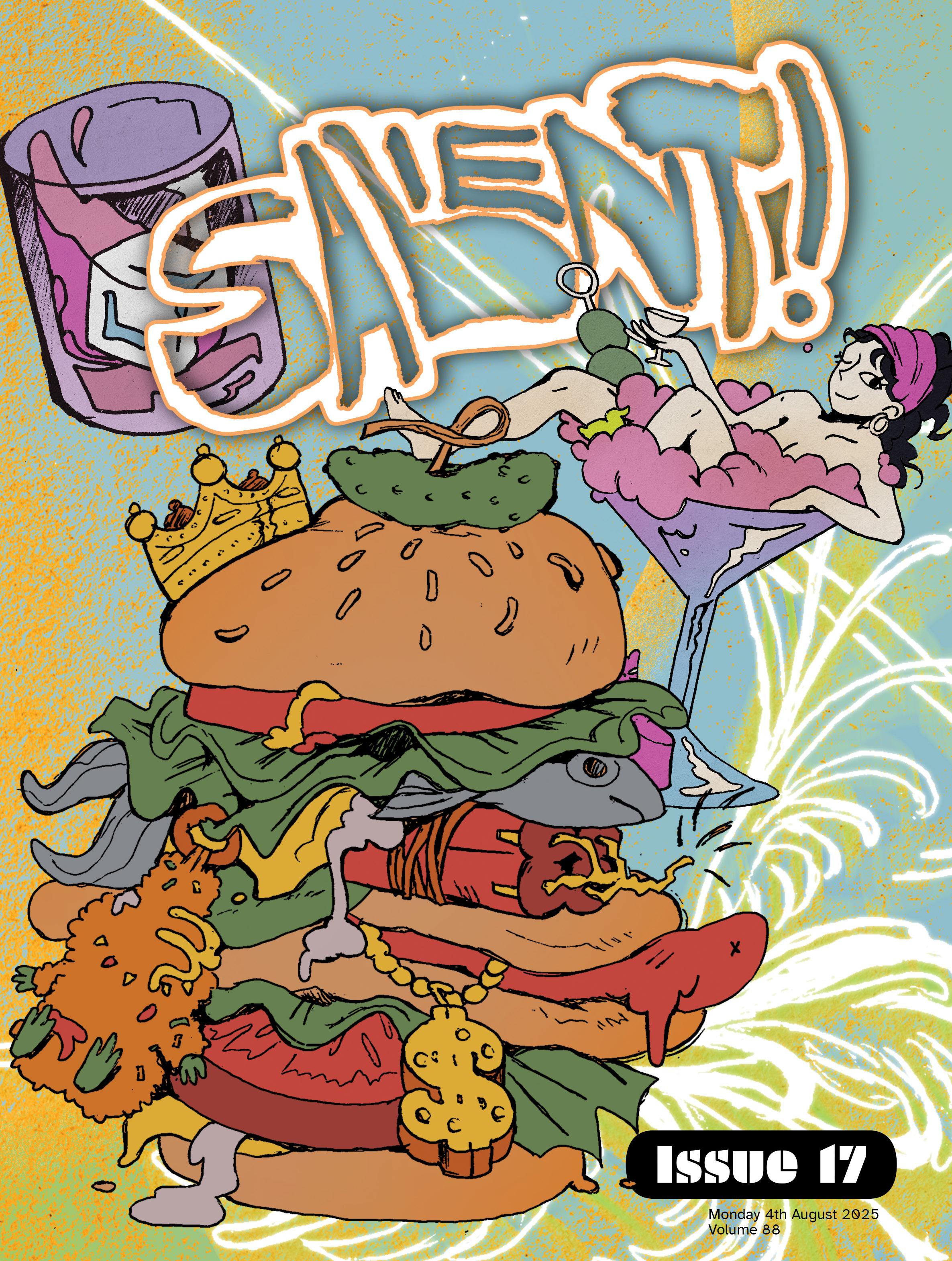

Editorial
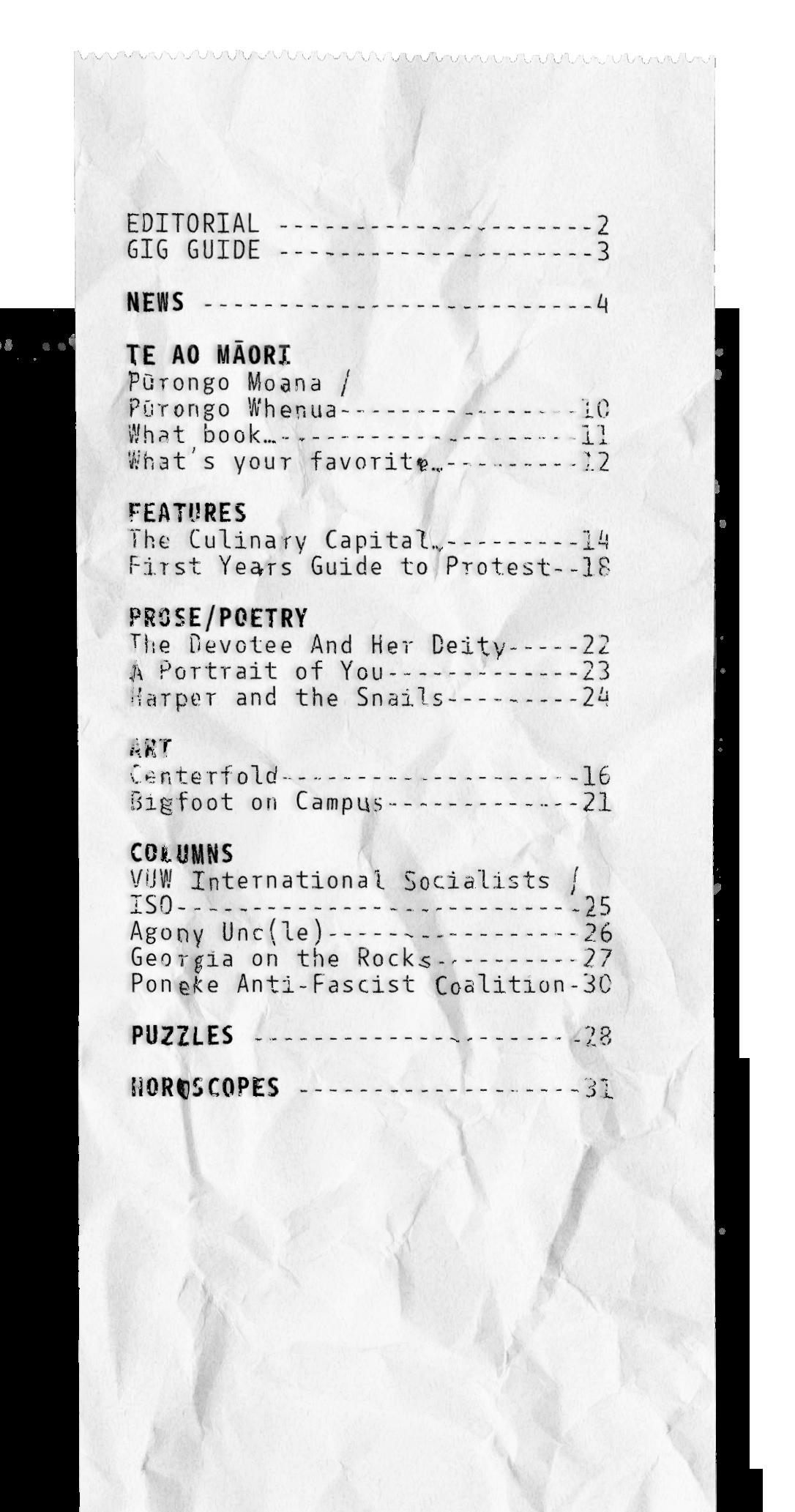
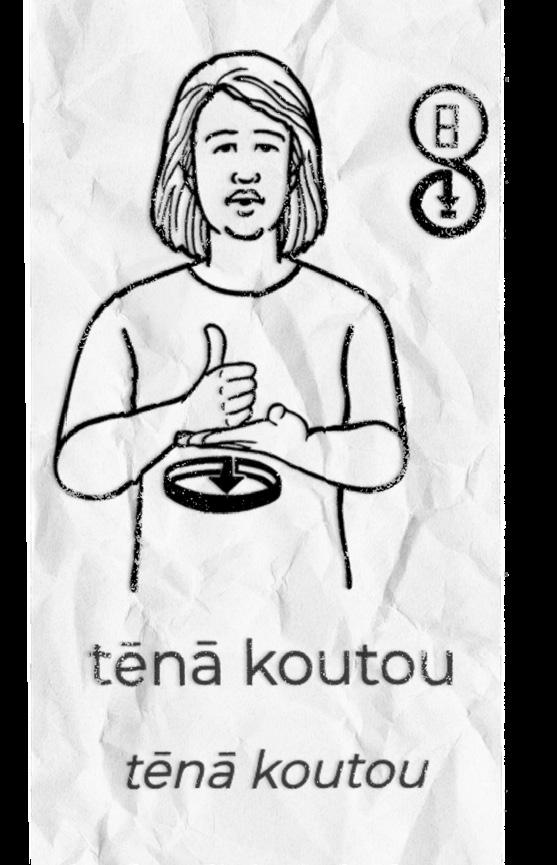
Kia ora e te whānau,
Week two. I’m officially in the driver’s seat—and it feels like a good time to talk about what we’re actually doing here for the rest of this year.
Salient has always been for students, by students. That’s not changing on my watch. If anything, I want to lean harder into it. This magazine is here to platform your voices. All of them. Not just the polished, professionalsounding ones. Not just the ones that fit into some tidy box. I’m talking hot takes, essays, rants, reviews, poetry, politics, obsessions, culture, miscellaneous—the stuff you care about. If it matters to you, it belongs in these pages.
For a lot of people, Salient will be your first ever byline. That’s no small thing. I want this space to feel like one where you can experiment, take risks, and grow. A space where you can feel proud to see your name in print. That doesn’t mean I’ll be hands-off—far from it. I’ll be working alongside writers to shape their pieces into the strongest versions they can be. That means editing deeply, giving proper feedback, and sometimes asking for a rewrite—but always with transparency, and always in a way that respects your voice. Every edit is a chance to learn, and I’ll be in it with you.
We can’t always pay contributors, but we can offer development— mentorship, workshops, close editorial support, and a platform with national reach. My inbox is open, and so is my office door. Got a pitch? Need help? Feeling stuck? Come through. This space is yours too.
And for the wider crew—staff, guest editors, everyone behind the scenes—here’s the deal: no unpaid overtime. No blurry boundaries. I want this to be a space where you feel supported, respected, and like your time is valued. If you're guest editing, I’ll meet you where you’re at. Want to run wild with a concept? Cool. Want a bit more help pulling things together? I’m here for that too. You won’t be left figuring it out on your own.
We’re also serious about upholding Te Tiriti o Waitangi in the way we edit, commission, and publish. That means carving out space for Māori voices—not as a token gesture, but because it’s core to how we want this place to operate. It’s a responsibility, and we’re taking it seriously.
At the end of the day, the values driving this thing are simple: transparency, growth, opportunity. We're building a culture here. One where people back each other. One where it’s okay to try stuff, get it wrong, and figure it out along the way.
That’s what we’re about. Let’s make something cool. By Phoebe
contents

Robertson
Writers on Mondays:
Delirious: Damien Wilkins (FREE!)
Time: Monday 12:15pm
Location: Te Papa
Acclaimed novelist (and ex-VUW student) damien Wilkens has released a new book (#14!) and wants to talk about it (with Emily Perkins!). ENGL kids this is for you.
Fringe Bar Comedy Club
Time: Wednesday 7pm
Location: Fringe Bar
A comedy show, with an on-licence, for only $10! Fringe’s weekly comedy nights see seasoned pros and new comics alike. Have a beer and a laugh.
We Are All Palestine Action!
Time: Friday 12:30pm
Location: UK High Commission to Police HQ
Join J4P and Peace Action Wellington to march against the genocide and affirm our right to protest. Stand with Palestine Action. SEE @just4pal FOR DETAILS.
Vagina Dry: Vagtastic Voyage
Time: Friday 8pm
Location: Valhalla
A night of unapologetically political feminist punk. Ōtepoti hardcore riot grrrl/feminist punks Vagina dry are in Pōneke for one big night at Valhalla.
Macho Macho (FREE!)
Time: Saturday 8pm
Location: Parrotdog Lyall Bay
A free gig from Pōneke indie rock stalwarts Macho Macho, a great venue, and the best beer in town. Supporting acts TBC.
PUP
Time: Wednesday 7:30pm
Location: San Fran
Hardcore punk anthems all night with Canadian punks PUP. Expect an energetic dance floor from modern punk royalty. Not to be missed.
Wanna Smash, Bro? (FREE!)
Time: Thursday 8:00pm
Location: Ivy Bar
A night of Switch classics like Super Smash Bros and Mario Cart, boardgames, and drinks deals—grab some friends, get competitive, or just unwind.
Sleeping Village, Big Pharma
Time: Friday 8:00pm
Location: San Fran
Two excellent bands this Friday at San Fran! Sleeping Village return with their experimental rock magic, alongside your favourite pharmaceutical enthusiasts. All for $10!
ANZ Drop Bathurst: Protect Denniston Plateau
Time: Friday 9:30am
Location: ANZ Bank, 215 Lambton
Fight back against destructive fasttracked mining from ANZ-backed Bathurst alongside Climate Liberation Aotearoa. Protect our wildlife and environment. Details: CLA Facebook.
Speed Dial
Time: Saturday 9pm
Location: Valhalla
A fast paced, multigenre, bass heavy, high-energy dancefloor from 9pm2am. Garage, jungle and drum and bass, all night.
Gigs + Events
EDITOR
Phoebe Robertson (Acting) TE AO MĀORI EDITOR
Taipari Taua
NEWS EDITOR
dan Moskovitz
NEWS WRITER
darcy Lawrey
Walter Zamalis
MUSIC EDITOR
Jia Sharma
SUB EDITOR
Henry Broadbent
COLUMN EDITOR
Georgia Wearing
DESIGNER
Cal Ma
JUNIOR DESIGNER
Nate Murray
FEATURE WRITER
Te Urukeiha Tuhua
SOCIAL MEDIA MANAGER
Teddy O’Neill
CONTRIBUTING WRITERS
Ryan Cleland
Saad Aamir
Guy van Egmond
CONTRIBUTING CARTOONIST
Jim Higgs
CENTERFOLD
Sophie Spencer
DISTRIBUTION
Saad Aamir
ADVERTISING SALES
advertising@vuwsa.org.nz
READ ONLINE salient.org.nz issuu.com/salientmagazine
GET IN TOUCH editor@salient.org.nz
Instagram/salientgram
Tweet/salientmagazine
Facebook/Salient
LETTERS

Got something to say about the magazine? Want it published? editor@salient.org.nz
Salient is published by, but remains editorially independent from, the Victoria University of Wellington Students Association (VUWSA). Salient is funded in part by VUWSA through the Student Services Levy. Salient is a member of the Aotearoa Student Press Association (ASPA).
Complaints regarding the material published in Salient should first be brought to the VUWSA CEO in writing (ceo@vuwsa.org.nz). Ideally, by motorcycle. A letter can also be sent to the editor, for their response/publication in the magazine. If not satisfied with the response, complaints should be directed to the Media Council (info@mediacouncil.org.nz).
Submit to Salient!

news....
Who’s Been To Council?
By darcy Lawrey (he/him)
This week, Salient asked candidates running for Wellington City Council a simple question: have you ever attended a council meeting? If so, what were your impressions? Here’s how their responses broke down:
Never Attended
Andrew Little, prominent mayoral candidate, has never attended a council meeting. He emphasized his experience with the skills “needed to be mayor”, including “analysing complex documents,” and cited his previous work at “the highest levels of government”.
Alex Baker, also running for major, told Salient last week that he has not attended a council meeting. However, after researching the council process, he was struck by the apparent lack of trust around the council table.
Joan Shi, running in the Lambton General Ward, said she doesn’t recall attending a council meeting in person. She expressed doubt about whether the council “truly listens”, which has discouraged her from attending—though she has submitted written feedback on the Long Term Plan.
Have Attended
Karl Teifenbacher , a mayoral candidate, has attended several Council meetings, particularly those concerning the Golden Mile and the sale of the council’s airport shares—both of which he opposed. He felt that “there was often a lack of attention paid to the public submitters.”
Matthew Reweti, running against current Mayor Tory Whanau in the Te Whanganui-a-Tara Māori Ward, made an oral submission to the Council’s Long Term Plan in 2023 on behalf of the Te Ātiawa Fisheries Trust. He opposed the airport share sale, calling the kauapapa “important to our Trust as kaitiaki and for our relationship with Te Taiao.”
Jonny Osborne, the Green Party candidate for the Eastern Ward, has presented on the Long Term Plan and water management reform. His impression of the meetings is that, “while anyone can attend or present to these meetings, it isn’t a great way of engaging with the community.” He advocates for less formal, more inclusive ways of engaging with the public.
Joy Gribben, Labour’s candidate in the Western Ward, says that attending meetings revealed that “often the elected representatives are not receiving all the information they would like.” As a former
Sam O’Brien, Labour’s candidate in the Eastern Ward, says he’s watched numerous Council meetings online—but hasn’t attended in person. He describes the meetings as “pretty dry”, and believes they need to be more accessible and engaging.
Ken Ah Kuoi, representing Independent Together in the Eastern Ward, has not attended a meeting. From watching online, he feels councillors “just rubber stamp whatever is presented,” and was “appalled” by what he saw as a “lack of understanding or experience.”
Tony De Lorenzo, Lampton Ward candidate, has not attended a meeting. He said that he tried watching online but found them too lengthy.
Principle Climate Resilience Advisor, she found Christchurch City Council to be more transparent, particularly on climate resilience issues.
Ray Bowden, ACT’s candidate in the Western Ward, attended in support of a proposed Inner City Bypass and felt that his views were heard.
Trish Given, running in the Eastern Ward, has attended meetings and found them “generally wellrun and structured”.
Andrea Compton, a Northern Ward candidate and former Independent Together member, has submitted multiple times. She described the council as efficient, with some councillors highly engaged.
Paula Muollo, Independent Together’s candidate in the Southern Ward, most recently attended council in support of the campaign to save the Begonia House. She described the council process as “very good”.
Afnan Al-Rubayee , Labour’s candidate for the Lambton General ward, has only attended council once—in 2021—but regularly watches meetings online. She’s concerned about accessibility and says she’s “committed to advocating for greater accessibility so that everyone [...] has a genuine opportunity to be heard and take part.”
Eyes on Exec: Academic VP Attains Standing Desk
dan Moskovitz (he/ him)
Ordinarily, the president’s office at the Victoria University of Wellington Students’ Association (VUWSA) is occupied by its president. duh. But for the past two weeks, that hasn’t been the case.
With President Liban Ali away, a power vacuum emerged. By tradition, the Academic Vice President steps in as acting president during such absences— and Ethan Rogacion, the current Academic VP, wasted no time in getting settled into his temporary domain.
It’s hard to blame him. The president’s office is a private sanctuary. The executive office? Shared. The president’s office has a fridge. The exec office has none. The president’s office boasts a standing desk. The exec office is stuck with the kind you sit at.
“The exec is stuck in the drudgery of having to sit in the same room as each other and having boring sit down desks, rather than exciting, manly, stand up desks,” said Acting President Rogacion, whom I would describe—accuratley as a twink.
He then mused that he’d never actually seen Ali use the standing desk, before wondering aloud whether Ali had legs.
The other prized furnishing of the president’s office is the aforementioned minifridge.
“I think the only thing it’s ever held is milk for stress free study week,” Rogacion said. “Which, like, come on. We’re a students association. We can think of other things to put in a mini fridge. Like beer! Or student journalists.”
He then announced his intention to put me, Salient’s News Editor, in his minifridge.
When asked about the threats made by his Acting President, VUWSA CEO Matthew Tucker stated: “I draw the line at putting cats in fridges.” When asked for clarification at the location of his own cat, dalphi, he refused to comment.
Coincidentially, one of Acting President Rogacion’s current VUWSA projects is an updated Salient code of conduct. His draft makes no mention of disciplinary measures involving refrigeration, so whether he’s compliant with his own proposed code of conduct is remains unclear.
New Zealand Universities Hate (Academic) Paywalls Too
dan Moskovitz (he/ him)
In a rare show of trans-Tasman unity, New Zealand universities are teaming up with their Australian counterparts to negotiate more favorable terms with major academic publishers—aiming to expand access to scholarly research while curbing costs.
Academic publishing remains a costly affair, with journals charging steep fees for both access and publication. According to Chris Whelan, chief executive of Universities New Zealand (UNZ), subscriptions to academic journals account roughly 60% of university library budgets.
So when contracts with four major publishers— Elsevier, Springer Nature, Wiley, and Taylor and Francis—came up for renewal simultaneously across both countries, the institutions seized the opportunity to negotiate collectively.
“Those four academic publishers publish roughly 10,300 journals collectively,” Whelan said. “As eight very small universities in a very large world, we don’t have much leverage. But we get a lot more if we negotiate with the 40 Australian universities.”
Central to the negotiations is the issue of open access publishing, which allows articles to be freely available for the public—typically for a higher fee up front. While costs vary by journal, Whelan estimates libraries are spending tens of millions of dollars annually on open access fees.
In a tertiary sector squeezed for cash, that’s a lot of money.
Open access is a major priority for UNZ, not only because it increases the visibility and impact of research, but also because most academic work is funded by the taxpayer.
“Almost all of our research is publicly funded, coming from either the government or directly through the universities.” Whelan says. “We have an obligation to make that public research publicly available.”
UNZ has set a target of 70% of Aotearoa’s academic output to be open access. Currently, the figure stands at 62 percent, and Whelan hopes the upcoming negotiations will help close the gap.
He expects agreements with the four publishers to be finalized within the next three to four months.

Leaked MoJ Proposal Reveals Planned Secret Terrorism Law Overhaul
Content Warning: Genocide, Police Violence
By Henry Broadbent (he/him)
A leaked Ministry of Justice document seen by the New Zealand Council for Civil Liberties (NZCL) reveals the Government is currently considering a secret proposal to overhaul the Terrorism Suppression Act, in a dangerously draconian development. The closed-door proposal includes the creation of new criminal offences encompassing expressions of support (distribution of information, display of symbols) and, notably, a focus on New Zealanders internet activity. Proposed changes could allow ministers to class online endorsement of/support for proscribed groups as “material support” for terrorist activity.
The consultation document reportedly also includes provisions to lengthen the period of designation from three years to five, and to make it far easier for the Government to label a group with the designation.
A statement from the NZCL has condemned the secret consultation, describing the closed doors process as “a disgrace”, and the proposed powers given to ministers as “dangerous” and open to misuse by the police.
Misuse of such laws overseas renders the threat posed by these proposals far from academic. Hundreds of people in the UK have been arrested in the past few weeks since the UK ban of Palestine Action as a terrorist organisation.
As Israel ruthlessly bombs Gaza, shoots children, aid seekers, doctors and journailists, and starves entire families to death each day, retired teachers, reverends, priests, former magistrates and charity directors are among those facing criminal charges in the UK for opposing the ongoing genocide. Already, police and ministers there are using the ambiguity of these authoritarian practices to blur lines further.
Last week, a protester in Kent was threatened with arrest by armed police and had her house raided for holding signs that simply read: “Free Gaza” and “Israel is committing genocide”.
Meanwhile, UK ministers continue to flagrantly break international law in their support for the Israeli war machine. Oppose their actions and you may face jail time. We must not let this be the case in Aotearoa.
We Are All Palestine Action
FRIdAY 8TH AUGUST 12:30PM - 1:30PM UK HIGH COMMISSION, 44 HILL STREET THORNdON to POLICE HQ, 41 VICTORIA STREET
Justice for Palestine and Peace Action Wellington are standing up for our collective right to protest this Friday. They are asking the public to join a march in solidarity with peaceful protest in the UK, against genocide, secretive consultation, and state repression.
Organisers state they “will not allow for attacks on our rights to freedom of expression and peaceful protest”.
If you choose to attend, visit @just4pal on Instagram for details, updates, and advice on attending the protest.
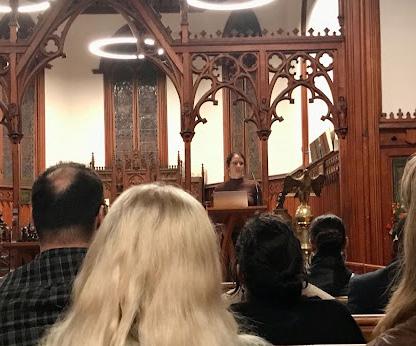
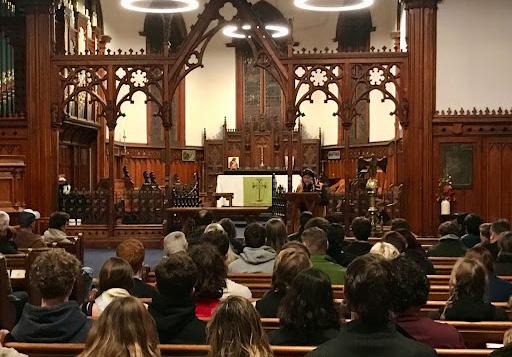
Opinion: Tamatha Paul Leads Panel on Rethinking New
Zealand’s Justice System
Guy van Egmond (he/him)
In the nave of St Peter’s on Willis last Monday, a crowd of people converged to hear Tamatha Paul and a panel of speakers speak against Aotearoa’s counterproductive justice system. There was a clandestine air before the event began, with vague flyers—“Join the Movement”—laid out on every seat. But as the space steadily filled with students, middle-aged locals and elderly alike, and MC Geordie Rogers asked us all to “squish up” on the pews, this air became one of shared purpose. The event, though limited by its tight one-hour slot, offered a range of perspectives that spoke to the need for a systemic sea change from a basis of compassion.
Paul opened with a reflection on her home town of Tokoroa, describing it as “a coin-flip town,” where the trajectory of someone’s life into poverty or crime is often out of their control. She challenged our revenge-based justice system that perpetuates this—focusing on longer prison sentences and fearmongering to win votes—even as court judges issue increasingly lighter sentences in response to unchecked rates of reoffence. She argued for a shift instead towards redistributive justice, where the pathways into crime are tackled with care and support.
Awatea Mita, from the Auckland Women’s Centre, seconded this vision, responding specifically to stalking offences. She described prisons as environments that reinforce psychological harm rather than heal it, while spaces where incarcerated people can seek help are underfunded. Mita also spoke to the colonial influence on whānau relationships that leads to disproportionate targeting of wahine Māori and Pasifika women, rooting these crimes beyond the justice system.
VUW’s d r. Luke Oldfield then offered an efficient and incisive overview of penal populism. He touched on populism’s origins as a left-wing people’s movement and how it has since twisted to favour select, outspoken groups. Oldfield presented immediate reforms, including the redesign of biased public opinion surveys, while reiterating the need for a systemic overhaul.
Reihana Ali, stepping in for Abdur Razzaq, spoke on behalf of the Federation of Islamic Associations NZ. She focused on addressing the root causes of crime, particularly the breeding grounds of hate that leads to violence like the Christchurch mosque attacks. Ali argued that our justice system should be not an outdated British model or one that seeks to profit off adversarialism, but community-led and based on Te Tiriti o Waitangi.
The final speaker, Emily Groen from the Wellington Community Justice Project, offered a vision for justice that moved away from dehumanizing language and argued that Aotearoa’s reoffence rates—currently above the OECd average—should be a key measure of success. Groen also called for a Te Tiriti-based system, working with hapū to establish support and rehabilitation. Groen echoed her precursors by concluding that we should focus not on revenge, but empathy.
Though it ran overtime, the event flew by. The speeches were largely conceptual and looking from the outside in. Nonetheless, they served well as a reminder of the kind of justice system we could build—one built around prevention by compassion. As attendees filtered out to Te Tai Ohinga next door for further discussion, It was nice to hear an older man summarize the night: “I don’t usually come out to these kinds of things, but that was really good. And what a great turnout.”
global news...
By Henry Broadbent (he/him)
US Treasury Sanctions Brazilian Supreme Court Judge
In a disturbing escalation of global fascist bonhomie, President Trump’s treasury department has sanctioned Alexandre de Moraes, the Brazilian supreme court judge overseeing prosecution against Jair Bolsonaro for his 2022 coup attempt. Shocking details of Bolsonaro's ultimately failed coup—which Moraes was instrumental in halting at the time—have emerged over the past year, including detailed plans to assassinate current left-wing president Lula de-Silva, the now sanctioned de Moraes, and then Vice President-elect Geraldo Alckmin. The would-be dictator, now on trial in
Brazil, has a close relationship with the US President and was hosted by Trump as his Mar-a-lago resort when they were both in power in 2020. Now, Trump is turning the might of a deeply politicised treasury against the Brazilian supreme court, concurrent with tariffs expressly enacted as retaliation for the criminal case against Bolsonaro. Lula remains publicly unperturbed, telling the press that Bolsonaro’s political future is a judicial matter and out of his control, in accordance with their constitution.
Horror in Gaza Grows: International Community Reacts, Barely
Content Warning: Genocide
International pressure continues to mount on Israel to end its genocide, world governments inching slightly closer to the demands of their citizens as protests against the horror in Gaza contine across the world. New Zealand is among 14 other countries, including Australia, Ireland and Canada, expressing a “willingness” to recognise the State of Palestine. Recognition of Palestinian statehood by the international community remains largely hypothetical, and declarations like this most recent one remain couched in ambiguity—but the declaration does include explicit condemnation of “the forced displacement of Palestinian civilians … [and] the blockade and starvation that have caused a devastating humanitarian catastrophe”. The declaration continues
in acknowledging that “Gaza is an integral part of the Palestinian state and must be unified with the West Bank. There must be no occupation, siege, territorial reduction, or forced displacement.”
The International Criminal Court, however, has indicated that a judgement on the genocide in Gaza is unlikely until 2027, at the very earliest. As Palestinians die of avoidable, manufactured starvation in growing numbers each day, international diplomacy continues to respond at a disturbingly glacial pace. Frustration at what many see as tokenistic responses happening far too late has been expressed in a Green press release urging the NZ Government to immediately recognise Palestinian statehood, and implement sanctions on Israel.
Te Maeva Nui 2025: Cook Islands Marks 60 Years of Self-Governance
Te Maeva Nui celebrations are ongoing across the Cook Islands as 60 years of free association with Aotearoa is marked. Formerly a dependency, the Cook Islands became an independent state in free association with Aotearoa with the enactment of the Constitution Act in August 1965. Early August now sees host to the largest Cook Islands cultural festival in the world, bringing thousands of Cook Islanders to Rarotonga for days of music, dance and celebrations. The week also saw commemorative church services, exhibitions and an official ceremony.
The 2025 ceremony comes during a period of tense political relations between the two nations; Foreign Minister Winston Peters has taken umbrage at Cook Island Prime Minister Mark Brown’s handling of a
strategic deal between Beijing and Avarua. Events reached a head earlier in the year, with Peters pausing $18.2 million dollars in core sector support for the Cook Islands, the aid suspension seen as a “significant escalation” by Cook Islands ministers.
Though questions remain about the necessity of Peters’ intercession into the affairs of a largely independent state remain, celebrations in the Cook Islands were not preoccupied with relations between Avarua and Wellington. The focus, instead, was on celebration—opening night saw a crowd of over 2000 people at Te Are Karioi Nui in Rarotonga, treated to what was described by local news as “electrifying performances”.


Harry Styles Wants to Get You Off
Your teenage celebrity crush is finally in your bedroom—sort of.
Sydney Sweeny becomes the face of ”Good Genes”
In a new series of American Eagle advertisements, Sydney Sweeney channels the legacy of Calvin Klein’s controversial 1980 campaign featuring a then-15year-old Brooke Shields. drawing on that provocative lineage, the ads use Sweeney to promote the denim by referencing genetic traits—sometimes through scripted lines, other times through silence.
The campaign’s aesthetic choices—its script, camera angles and overt nods to the original ads—have sparked criticism for invoking themes of racial bias, sexualization and eugenics. American Eagle claims that proceeds from the “Sydney Jean” will benefit the Crisis Text Line, a helpline for victims of domestic violence, though no such partnership is currently listed on their website.
Whether or not this campaign is tone-deaf (it is) or simply effective marketing, one thing is clear: it’s definitely all American.
Astronomer Hides Behind Gwyneth Paltrow
In a move that has raised more eyebrows than answers, the data company whose CEO and chief people officer publicly revealed their affair on a kiss cam at a Coldplay concert has chosen silence as their official response. Instead of addressing the controversy, the company has enlisted Gweneth Paltrow—whose exhusband, Chris Martin, happens to be Coldplay’s frontman—to redirect attention.
Rather than clarifying the situation, Paltrow has been deployed to spotlight the company’s core business: data workflow automation. “We've been thrilled so many people have a newfound interest in data workflow automation” she said, side stepping the affair entirely. The strategy appears to be one of calculated deflection—leveraging celebrity proximity curiosity to turn scandal into marketing. Whether it works remains to be seen, but it’s obvious that the company is betting the intrigue sells better than transparency.
Pleasing, the lifestyle and beauty brand founded by Harry Styles, has released its first brand sex toy and lubricant: a double-sided vibrator and a premium silicone-based lube.
The company’s tagline? “Please yourself like you mean it”.
In addition to distributing branded condoms at pop-up events, Pleasing has partnered with Planned Parenthood to produce a series of sex education videos and instructional materials for its products.
The vibrator—which bears more than a passing resemblance to a concert lightstick or sleek space probe—is already sold out. Should it return to stock, it will retail for $120; the lubricant is priced at $44.
Hulk Hogan K.O’s By Shaun Harty “Train, say your prayers and eat your vitamins.” Long before we couldn’t see John Cena or smell what The Rock was cooking, the late Terry Bollea—better known as Hulk Hogan—captured the imagination of a generation. In bright yellow tights and red boots, he ran wild with Hulkamania, becoming a cultural icon of the 1980s and ‘90s.
From body-slamming Andre the Giant at Madison Square Garden to turning heel against “Macho Man” Randy Savage and ushering in the black-and-white cool of the New World Order (nWo), Hogan helped transform professional wrestling into a global entertainment phenomenon. His stardom paved the way for the rise of legends like “Stone Cold” Steve Austin, Rey Mysterio, and Rhea Ripley.
Hogan embraced the outsized persona that made him a household name—not just in the ring, but on screen. Whether trading punches with Sylvester Stallone in Rocky III, playing the unlikely babysitter in Mr. Nanny, or starring in the reality series Hogan Knows Best, he became a fixture of pop culture. Alongside icons like Ozzy Osbourne, Hogan helped ignite the reality TV boom of the early 2000s.
While his legacy is not without controversy—there’s plenty to unpack, brother—this moment calls for reflection and respect. He may not be your favorite wrestler’s favorite wrestler, but he’s likely the one who started it all for them.
Georgia Wearing (she/her)
Image: Instagram/ American Eagle
pūrongo moana, pūrongo whenua
Māori and Pasifika News
By Taipari Taua (Muriwhenua, Ngāpuhi)
‘Epetome o te Reo Māori Kuki ‘AiraniCook Islands Language Week
It’s Cook Islands Language Week! From 3 - 9 of August. The theme for 2025’s ‘Epetome o te Reo
Māori Kuki ‘Airani is Ātui'tui’ia au ki te raurau a tōku matakeinanga – “Connect me to the offerings of my people'.
Here are some phrases and words to include in your speech - encourage your ‘oa to kōrero te reo Māori Kuki ‘Airani.
Kia ōrana - Hello
Aere ra - Goodbye
Pē’ea koe? - How are you?
Ko … tōku ingoa - My name is …
Meitaki - Thank you
Mako rai - Well done
Akarongo mai - Listen here
‘Oa - Friend
Kōrero - Speak
Māori Roll Enrollees Dropped From Māori Roll
He nui ngā Māori kua taka i te rārangi pōti Māori i tērā wiki. I a rātou e tirotiro ana ki tā rātou tūnga ki te pae tukutuku o te Kaitiaki Take Kōwhiri, ka kitea kua mahue katoa rātou mai te puka whakauru pōti, ā, kua whakawhitia ki te rārangi pōti matua kē, ahakoa tā rātou kore panoni tūnga. I mea mai te Kaitiaki Take Kōwhiri kāore he raru hei tā rātou whakawā, hoinānō, ko tērā hunga tonu kua pā ki tēnei tūāhua tonu kīhai i panoni i tā rātou tūnga me te mea hoki kua noho ki te rārangi pōti Māori mō te wā roa, ā, kua kaha tuku pōti hoki. I whakatakoto te mānuke e tētahi o ngā kaiarahi o Te Pāti Māori, a debbie Ngarewa-Packer, kia rite, kia mataara ngā pūnaha o te Kaitiaki Take Kōwhiri ki ngā panonitanga o te kāwanatanga kia pai ai te pōti o Ngāi Māori. Ka hua mai tēnei take whaimuri ake i te karere ā te kāwatanga mō te panonitanga o ngā ture pōti, pērā i te whakakāhore te tuku pōti ā ngā tāngata e noho ana ki ngā whare herehere. Kua meatia e te iwi whānui he ture pēhi, he ture tāmi ēnei ture.
Hundreds of Māori voters were stunned last week after discovering they had been shifted from the Māori roll to the general roll—or removed from the electoral role entirely. Upon checking their enrollment status, many were met with a message stating that their information could not be found.
The Electoral Commission has denied any fault in its system attributing the issue to potential user error. Yet many Māori voters—who have consistently voted on the Māori roll for years while residing at the same address— have experienced this issue.
Te Pāti Māori co-leader debbie Ngarewa-Packer challenged the Electoral Commission, urging it to demonstrate that its systems are equipped to handle the government’s newly introduced electoral changes.
The controversy comes amid sweeping reforms to New Zealand’s voting laws, recently announced by the government. These include a ban on prisoner voting, the closure of enrolments 13 days before election day, and the provision of free food at polling stations. The changes have sparked widespread criticism, including from AttorneyGeneral Judith Collins, who warned Prime Minister Christopher Luxon that the reforms may breach human rights law.
What book from Taipari’s shelf are you?
Q1: Your dream car is a:
A. Pink or white convertible Jeep
B. Horse
C. Green VW Beetle
d. Any car you can stick a bunch of stickers on
Q2: Your IG feed is full of:
A. Maramataka posts
B. diving videos
C. Curated “dumps” where the photos overlap each other
d Eru Kapa-Kingi & Riana Te Ngahue
Q3: Your go to drink order:
A. Aperol Spritz
B. Beer – Piss is piss
C. Matcha
d Not Coca-Cola (girl, the boycott!)
Q4: Your most used app:
A. Instagram
B. Facebook
C. Pinterest
d. Notes
Q5: Fav subject at school:
A. Biology
B. Whakairo or woodwork
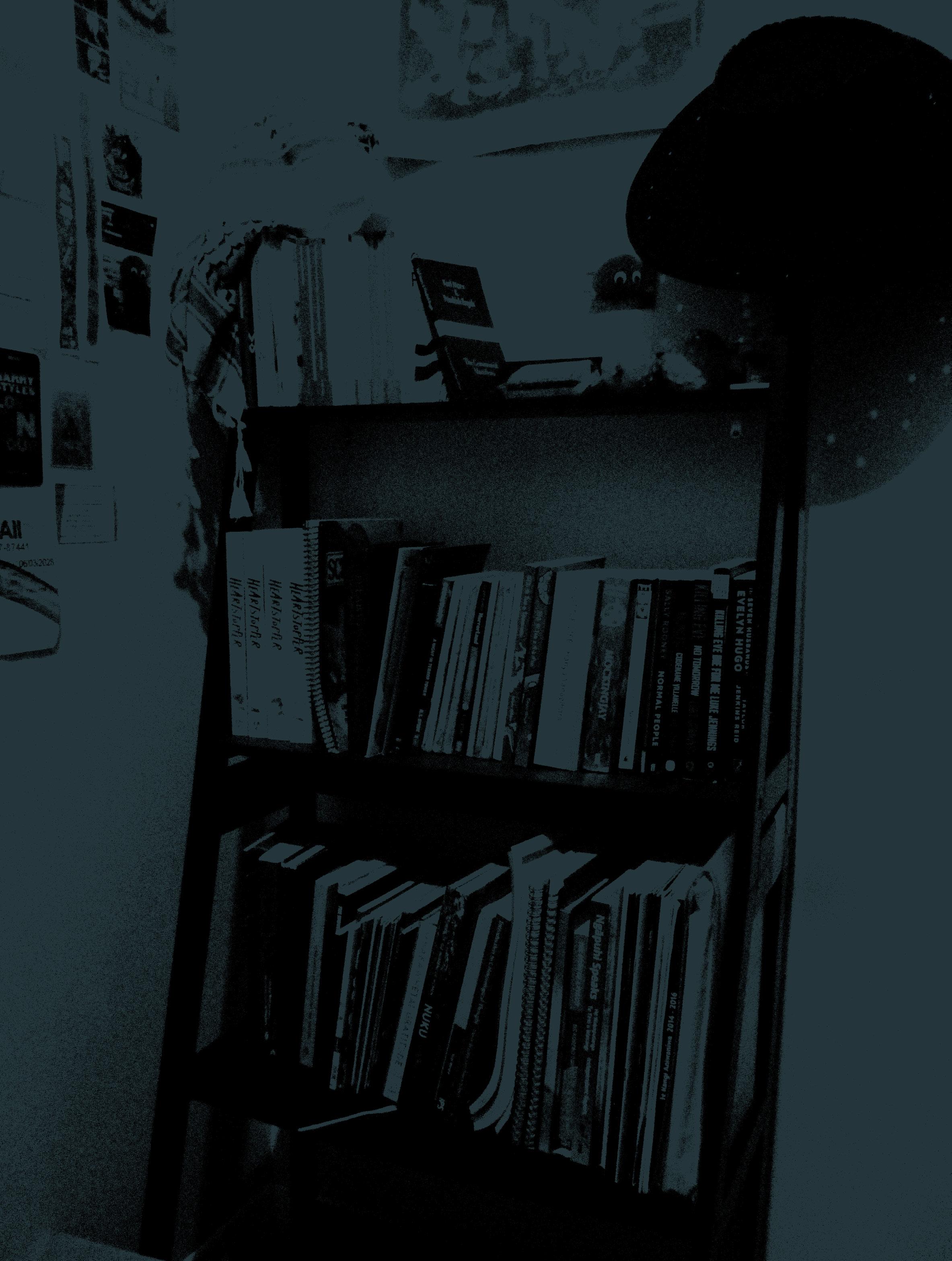
Mostly A’s:
You do NOT play about the “clean-girl” aesthetic. Your room is probably immaculate, probably kitted out with a sunset lamp. At any given time you are ready to be caught in a candid, and we’re gonna need to pry the gel for your slick back from your Cheirosa 71 scented hands. You probably have Capricorn, Virgo, or Libra in your chart. You love to be organised and focused on your tasks so I’m assigning you WHAKAWHĒTAI: Gratitude by Hira Nathan – A bilingual journal to help improve your reo and your life! Because you also love to be inspired, I’m also assigning you NUKU: Stories of 100 Indigenous Women by Qiane Matata-Sipu – a collection of stories from indigenous women all over the world.
C. English – you were probs besties with the teacher
d Social Studies/Tikanga-ā-Iwi because you liked to argue with the teacher
Q6: Your notes app is full of:
A. To do lists & recipes from tiktok
B. Reasons why david Seymour is not your uncle
C. Texts you never sent & half arsed poetry
d Big messages that you practiced writing in the app before sending
Q7: In your downtime you like to:
A. Go on walks with your friends
B. Buy muskets
C. Somewhere in nature by yourself where you can listen to music and “forest bathe”
d. Talk about the political and economic state of the world
Q8: The walls in your room are covered in:
A. Goal planning sheet & minimalist posters
B. Bob Marley poster & cowboy hat
C. A tapestry & Salient centrefolds
d. Tino Rangatiratanga flag & political posters
Q9: I open up your story and I see:
A. New pāua french tip set
B. Nothing (you have no wifi)
C. A photo of nature with an Adrienne Lenker song playing
d. Something political/a reminder to vote
Q10: What’s your fav colour?
A. Beige and/or Pink ��
B. Red��
C. Green��
d. Red, white, and black✊
Mostly B’s: Mostly C’s: Mostly D’s:
You’re from Ngāpuhi – like me! Chur cuz, I know life is hard. People love to rip the piss out of us, you’re probably tired of reminding people that not all Ngāpuhi chiefs were bloodthirsty psychopaths, hell – even the government is trying to force us to settle��. To remind us of the resilience of our tūpuna, I’m assigning you a couple of Ngāpuhi books from my shelf.
The first one, Ngāpuhi Speaks, is an independent report on Te Wakaputanga o te Rangatiratanga o Niu Tireni as well as Te Tiriti o Waitangi, commissioned by our kaumātua. It’s a summary of evidence given at the initial hearings of the WAI1040 Waitangi Tribunal “Ngāpuhi Claims.” It’s got really valuable information about the formation of two of our founding documents. The next book is Ko Tautoro te pito o tōku ao: A Ngāpuhi narrative by Hone Sadler. Another book about evidence given at the WAI1040 claims, this time it’s Sadler’s account of the origins, history, and culture of Ngāpuhi Nui Tonu. Bleh!
I know your fits go crazyyy. You probably have curated Spotify playlists with vague names and pretty covers from Pinterest. You’re probably an Arts major as well as a dabbler is some form of art. There’s an urupā of dead plants in your room next to all the knick knacks you’ve collected over the years. I know you’ll appreciate some good poetry so I’m assigning you Rangikura, the fiery collection of poetry by Tayi Tibble. I’m also assigning Oriori, a breathtaking book of poetry by Roma Potiki and paintings by Robyn Kahukiwa that takes you through the beginning of the Māori cycle of life – from conception to birth.
You are that friend that is too woke, but so am I :) You’re loud and proud about your values and you love to keep yourself and your friends educated on all things race, gender, and class. If you haven’t read them already, the first book I’m assigning you is the Mana Wāhine Reader (Volume 1). It’s a brilliant collection of writings from 1987-1998 including Linda Tuhiwai-Smith, Ngāhuia Te Awekōtuku, and many other inspiring wāhine Māori. The second book is Kia Mau: Resisting Colonial Fictions, a collection of essays from the badass activist Tina Ngata. It’s all about protesting and disproving TUIA250, the commemorations for the 250 year anniversary since Captain Cook’s arrival.
By Taipari Taua (Muriwhenua, Ngāpuhi)
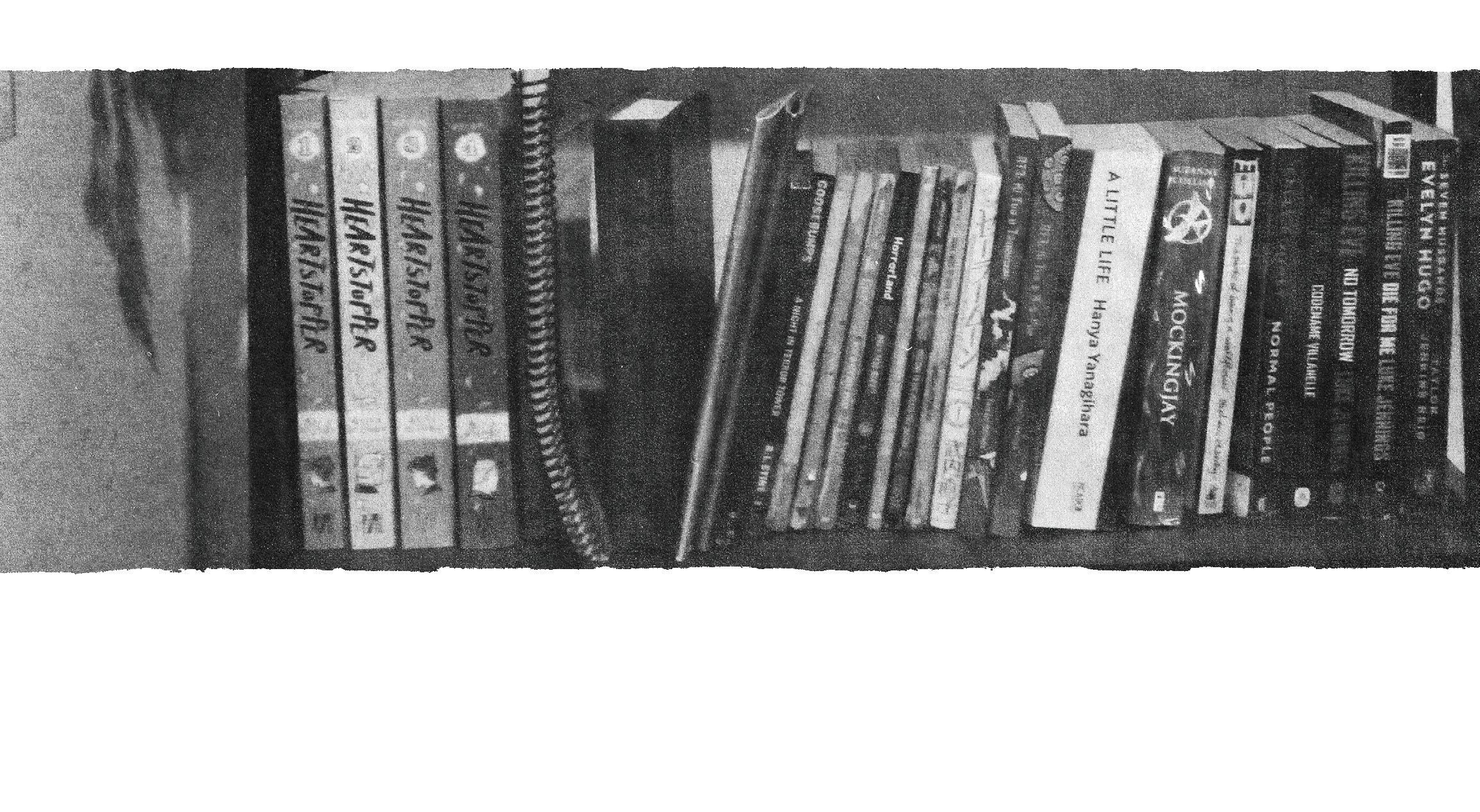
What's favouriteyour favourite Māori book?
Arabella King
(Ngā Ruahine, Taranaki, Te Ātiawa, Te Aitanga a Hauiti, Ngāti Hauā)
Books: Aroha & Wawata by Dr Hinemoa Elder
These two books, written by Dr Hinemoa Elder, are some of my favourites. They are perfect for when you are short on time but in need of some wise words. The books provide short 1-2 page long explanations or applications of different whakataukī (proverbs), helping to incorporate Māori wisdom into your daily life. One of my favourites is in the Aroha book: “Poipoia te kākano kia pūāwai,” which translates to “Nurture the seed and it will bloom.” This is a whakataukī I frequently return to because just as plants need nourishment to grow, so do all the aspects of our lives. By nurturing your mind, heart, family and relationships, they too will grow and blossom. That blossom is the peak of the cycle and it is best appreciated when you can look back and reflect on the hard work you put in to get there. This whakataukī reminds me that no act is for nothing, and that by taking small, seemingly insignificant (and sometimes tedious) steps, it will eventually create a blossom within an aspect of my life.
Mukai Duder-Hura
(Ngāti Hine, Ngāpuhi)
Book:
Ka Whawhai Tonu Māori by Dr Ranginui Walker
As a historical text, it provides insights into our struggle, as Māori, for tino rangatiratanga and mana motuhake on our own whenua. Dr Walker's writing connects past struggles to present day challenges, making it not only educational but also a constant reminder of the resilience and resistance of our people. Even though it was first published in 1990, the text is still very much relevant to this day. It continues to shape my understanding of our history and our unique identity as Māori, guiding me to reflect on how these struggles shape our present and future. From uni assignments, to pātai I might have randomly throughout the day, it's a text that never stops teaching me, and for that reason, it remains one of my favourite pukapuka to always refer back to.
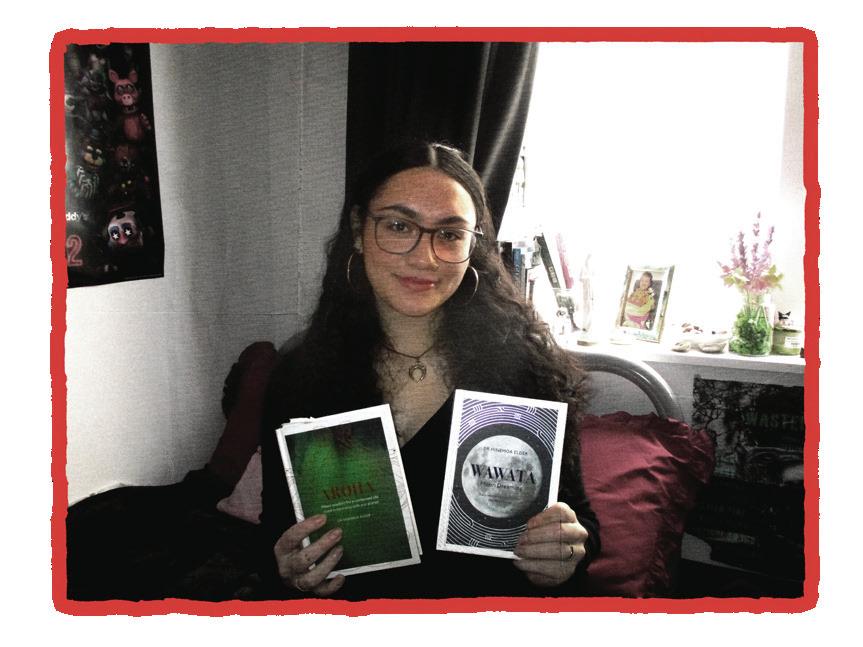
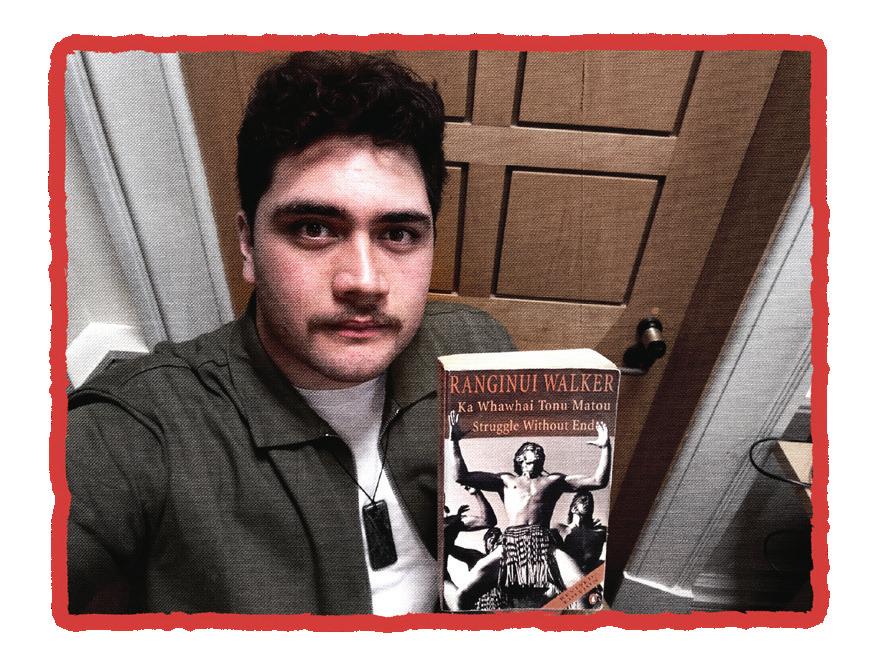
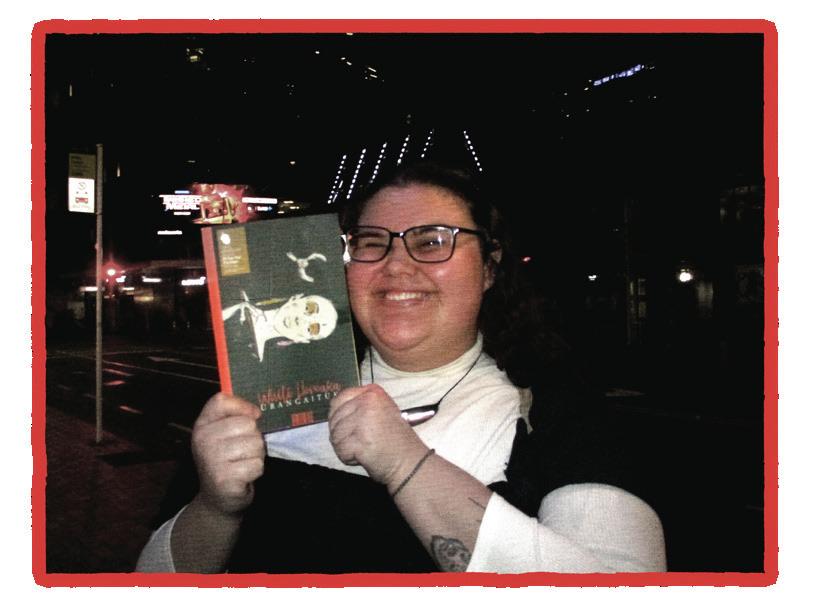

Maia Berryman-Kamp
(Te Arawa, Mataatua)
Book: Kurangaituku by Whiti Hereaka
First off: I’m Te Arawa hard so anytime our pūrākau are there, I’m sat. Fr fr though, Kurangaituku does what few books can actually pull off - narrative and structural harmony. There are 3 stories within the one pukapuka, the before, the after, and the during. They're readable in any order (though my favourite is the after section), and they work together with the writing to create a story that leans on trust, time, and belief. The writing is guttural at times of violence, but warm at times of solitude. The flow feels like oratory, not the written word, and the imagery is so rich you’ll reread it just to envision the scenes again. It's often said that you cannot understand te ao Māori through English words—to anyone with this whakaaro, read this book and come back to me—Hereaka nails the feeling of hara, the embrace of the taiao, and the weight of whānau with unquestionably Māori grace.
Ngārewarewa Tata
(Tainui, Mataatua)
Pukapuka: Te Marautanga o te Aho Matua
Ko te tino kaupapa o teenei pukapuka, he rauemi maa ngaa kaiako Kura Kaupapa Maaori hei haapai i taa raatou whakaako i ngaa maataapono o Te Aho Matua. Naa, ko teetahi o ngaa kaupapa kua waawaahia e te puka nei ko te hiitori o te Kura Kaupapa Maaori. I reira ka whakamaarama ai te pukapuka i ngaa tino toki i whakaairo, i whakaraakei, i whaoa te kaupapa nei e kiia nei ko te Kura Kaupapa Māori. Kua waawaahi te pukapuka nei i eetahi mahi maa ngaa tauira me ngaa kaiako kia taunaki i ia maataapono o Te Aho Matua. E tino rata ana au ki teenei pukapuka naa taku whakatipuranga i teetahi Kura Maaori, aa, e ngaakau whiwhita ana ki te reo Maaori me toona whakarauoratanga.
Ngahuia Benefield
(Ngāti Toa Rangatira)
Book: Māori and the Criminal Justice System: He Whaipaanga Hou, a New Perspective by Dr Moana Jackson
Mā te tohunga whakairo anō e kōrero te whakairo
Mā te whakatō kai anō e kōrero te whakatō kai
The expert carver speaks with authority on carving
The expert gardener speaks with authority on gardening
This is the whakataukī (proverb) that Dr Moana Jackson used to open this report in 1987. It echoes the need for Māori research to be done within a Māori cultural framework—a by Māori, for Māori approach—it’s particularly pertinent as the report itself addresses the issues that Māori face within the Criminal Justice System. Although published in 1987, as the name states, it’s still a fresh and new perspective not often seen in Criminology. He Whaipaanga Hou shows how crime can be attributed to society’s actions and attitudes, and emphasises the importance of “[Enabling] the justice system to see itself through the eyes of the community from which most of its defendants come.” After discovering the book through my Criminology readings I found the report highly informative, intriguing, and inspirational.

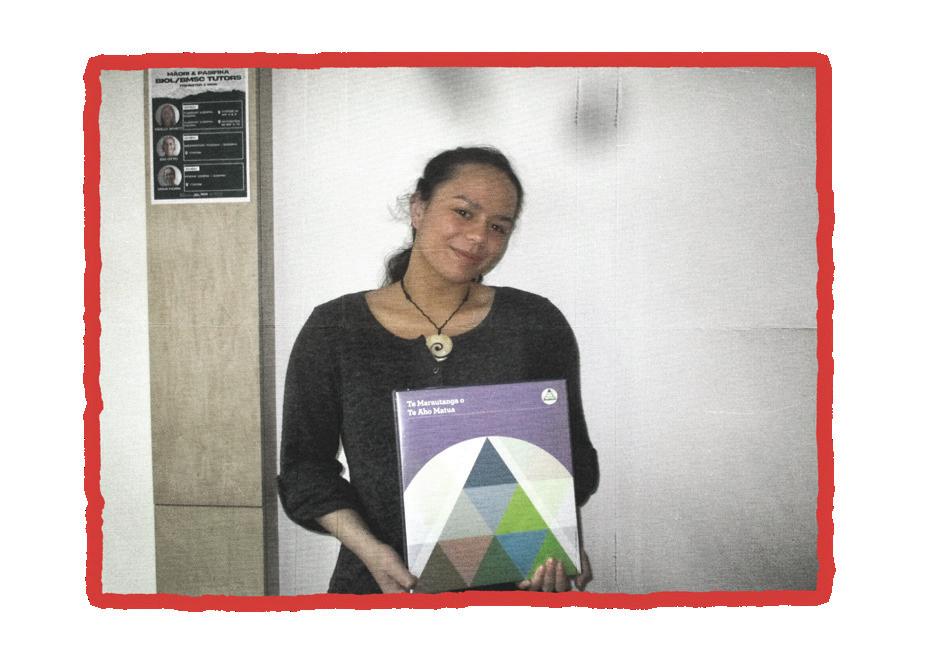
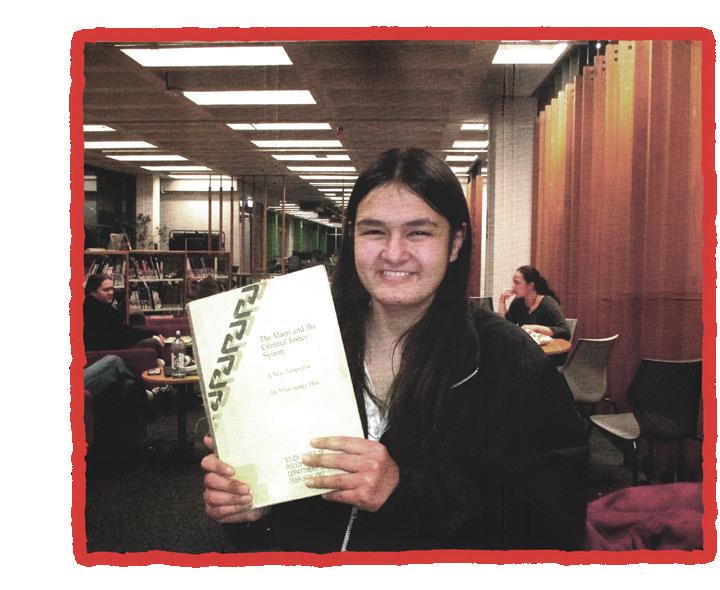
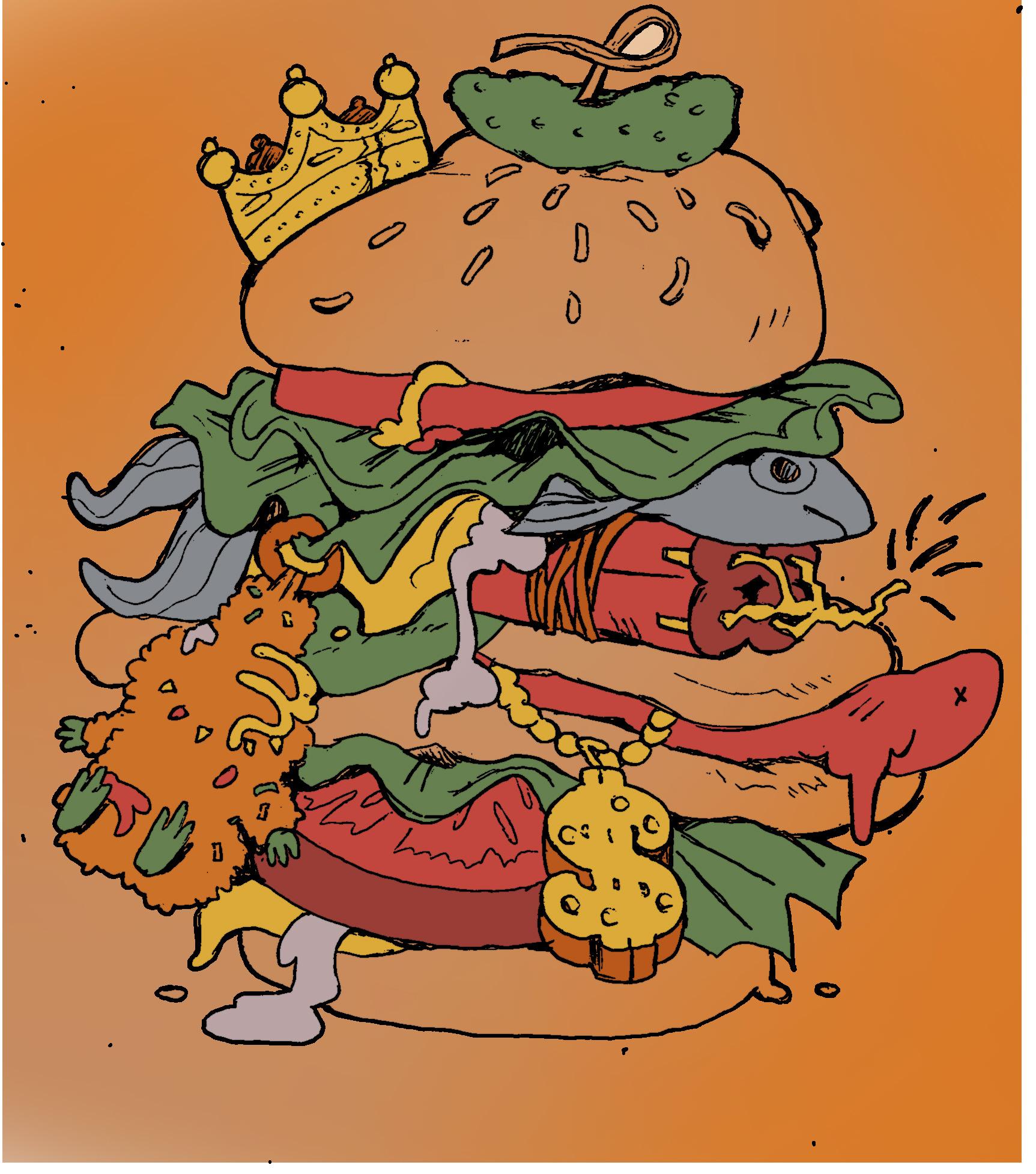
The Culinary Capital is Losing its Flavor
For as long as I can remember, Wellington has been heralded as New Zealand’s culinary capital. The city offers everything a diner could desire— from fine dining at multi-hatted institutions like Logan Brown to more casual eats at beloved spots like 1154 and Fidel’s. Within a 15-minute walk, you can move from the experimental to the shit pub fare.
I never had intended to work in hospitality. Yet here I am, cooking at one of Wellington’s more prominent establishments. When I started, I had no culinary knowledge or industry connections. Still, three looming spectres were always present: Vias’s Wellington On a Plate (WOaP), the slow death of hospo, and the annual migration
Author: CdP (he/him)
of our most talented servers, chefs, bartenders, and adjacent professionals. We all know where they’re going.
Every year, WOaP arrives like clockwork—an event that hospitality workers either dread or adore. It’s infamous for its innovative burger creations and dazzling events, drawing enthusiasm from every corner of the city, from Bluebridge (Yes, the ferry company) to Boulcott St Bistro. For a brief period the entire hospo community throws itself into creating the best possible experience or the most headline-worthy burger. It’s a beautiful expression of culinary crativity—but it’s also exhausting.
Why must restaurants reinvent the wheel every year? Why are we locked into this format?
Conceptually, these creations are cool. But when a burger hits nearly $30, you have to ask: are we cooking for the customer, or for our own image?
There’s an unspoken pressure to outdo last year’s efforts, to push the boat out further and further. Burgers become increasingly elaborate, often veering into the absurd. I understand the appeal—burgers are endlessly modifible— but I struggle with the constraint. Why must restaurants reinvent the wheel every year? Why are we locked into this format?
Letting chefs express themselves is beautiful, but at what point do we conclude that maybe we need to move on from burgers made with Kiwi Onion dip and Black Milk Buns and have a stab at another dish, or entirely remove this constraint? Conceptually, these creations are cool. But when a burger hits nearly $30, you have to ask: are we cooking for the customer, or for our own image?
What about the patisseries too small to host events? Or chefs like me, whose strengths lie outside the burger realm? I spoke with a colleague about what it would take for our workplace to participate, and we both agreed: “The mise [short for mise en place or prep] would be bullshit.” And quite frankly, I don’t really want to make more brioche than I already have to.
The events side of WOaP is genuinely interesting—take-overs, lectures, and immersive experiences, many of which are free. I encourage everyone to attend. But realistically, WOaP is, to some extent, an expression of vanity. That’s okay. Still, as a community, shouldn’t we ensure that we’re not just attracting out-of-towners to multi-hundred-dollar events, but also engaging with the wider Wellington public?
I’ve only ever worked in one restaurant, but I’ve worked with a wide range of people. Every year, I watch incredibly talented young professionals
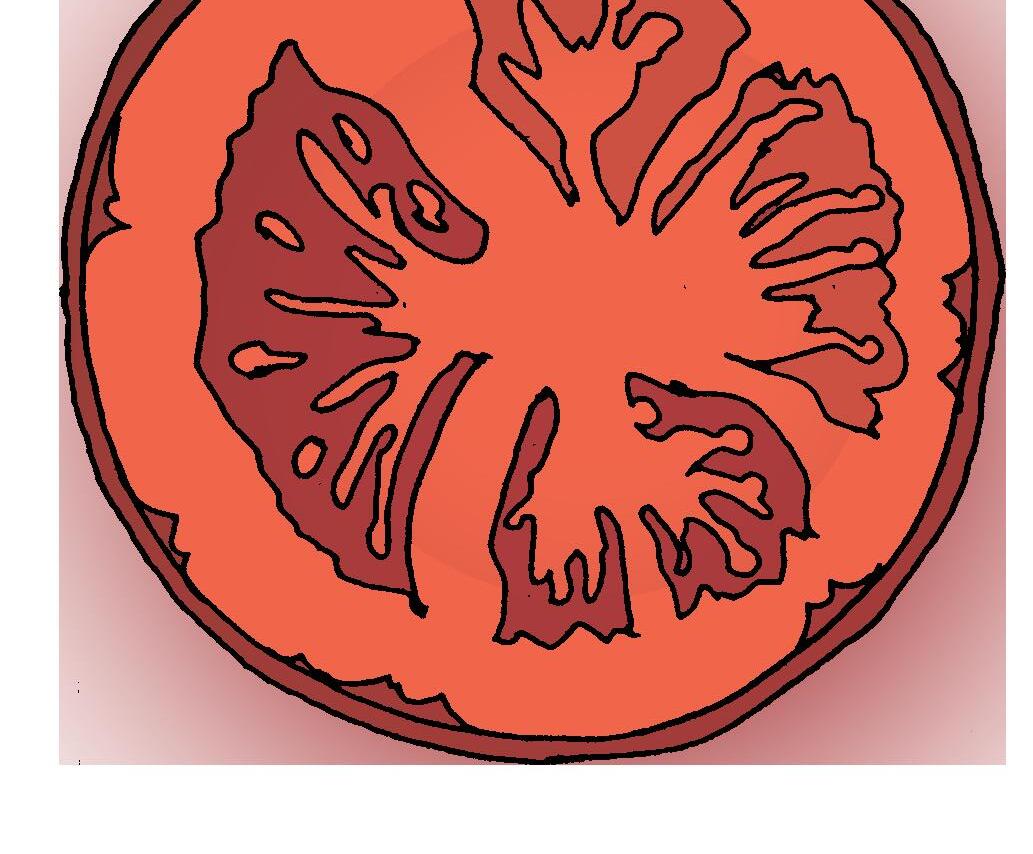
leave—headed for Melbourne, Hong Kong, London. I’m thrilled for them. Melbourne, for instance, is a culinary powerhouse, and I am always filled with joy seeing my former colleagues and friends over there working at beautiful locations, creating amazing food. But this drain of talent is slowly sucking the life out of our community.
Yes, new professionals arrive. Yes, great venues still exist. But each year, I say goodbye to friends I may never see again. It’s draining. If you work in hospo, you know the depth of this community—you also probably know someone who’s left Wellington for better opportunities abroad.
I don’t have the answers. This isn’t something I see as my permanent career, and I’m not qualified to prescribe solutions. But I can see what’s happening: places are closing, and the ones opening are all trying to be the next Logan Brown, High Water, or Koji. In my view, Wellington is losing what made it special—its innovation and diversity.
I’ve spoken with my Head Chef on this. We agree: we need something different. From the rich seafood and stews of Portuguese cuisine to the herbaceous flavors of Laotian cooking, there’s so much potential. We still have some gems—Ascot for drinks, Satay Kingdom for dinner. Fleeting breaths of what Wellington’s culinary culture used to be.
But I’d be lying if I said I hadn’t stood at my section, wondering: did we fall off? Got you in your room rippin’ every chronic poster on your wall off? We’re still pushing the boat out—just in the wrong direction.
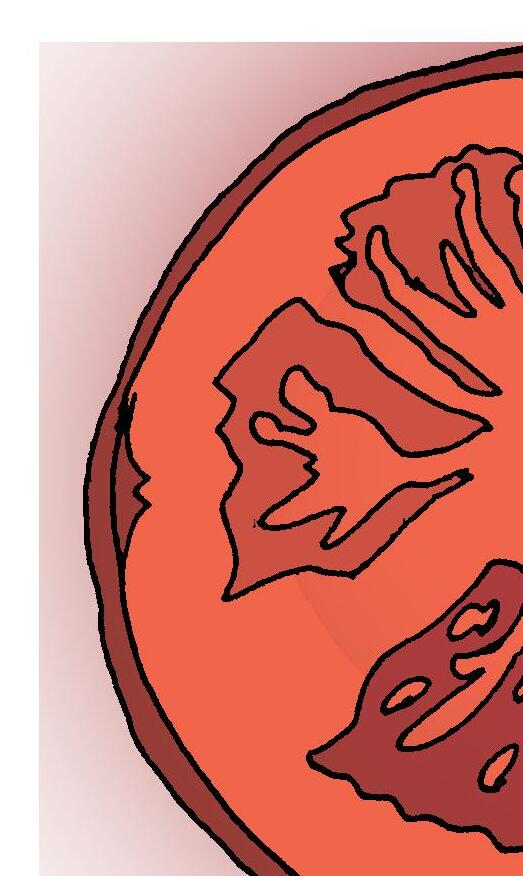
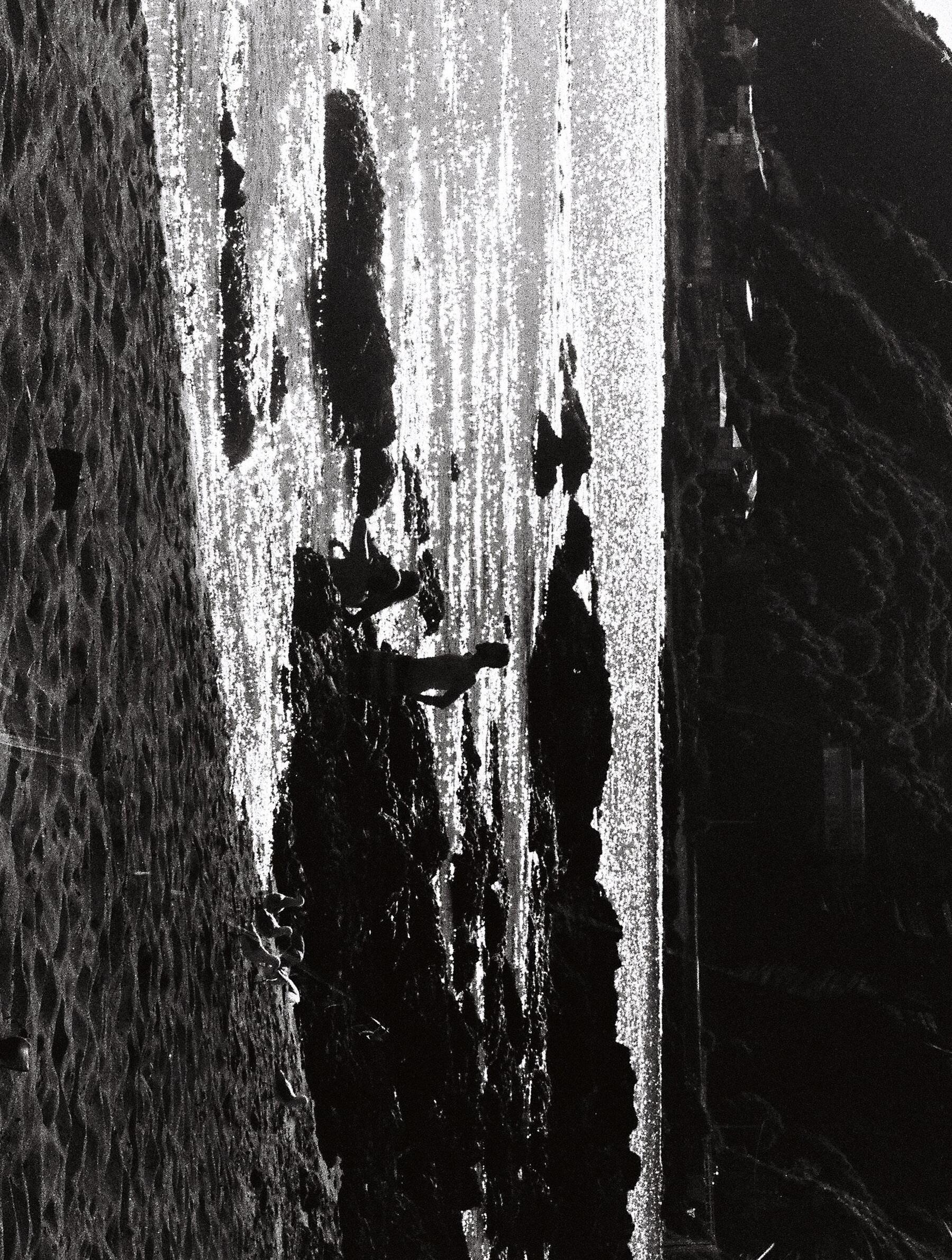
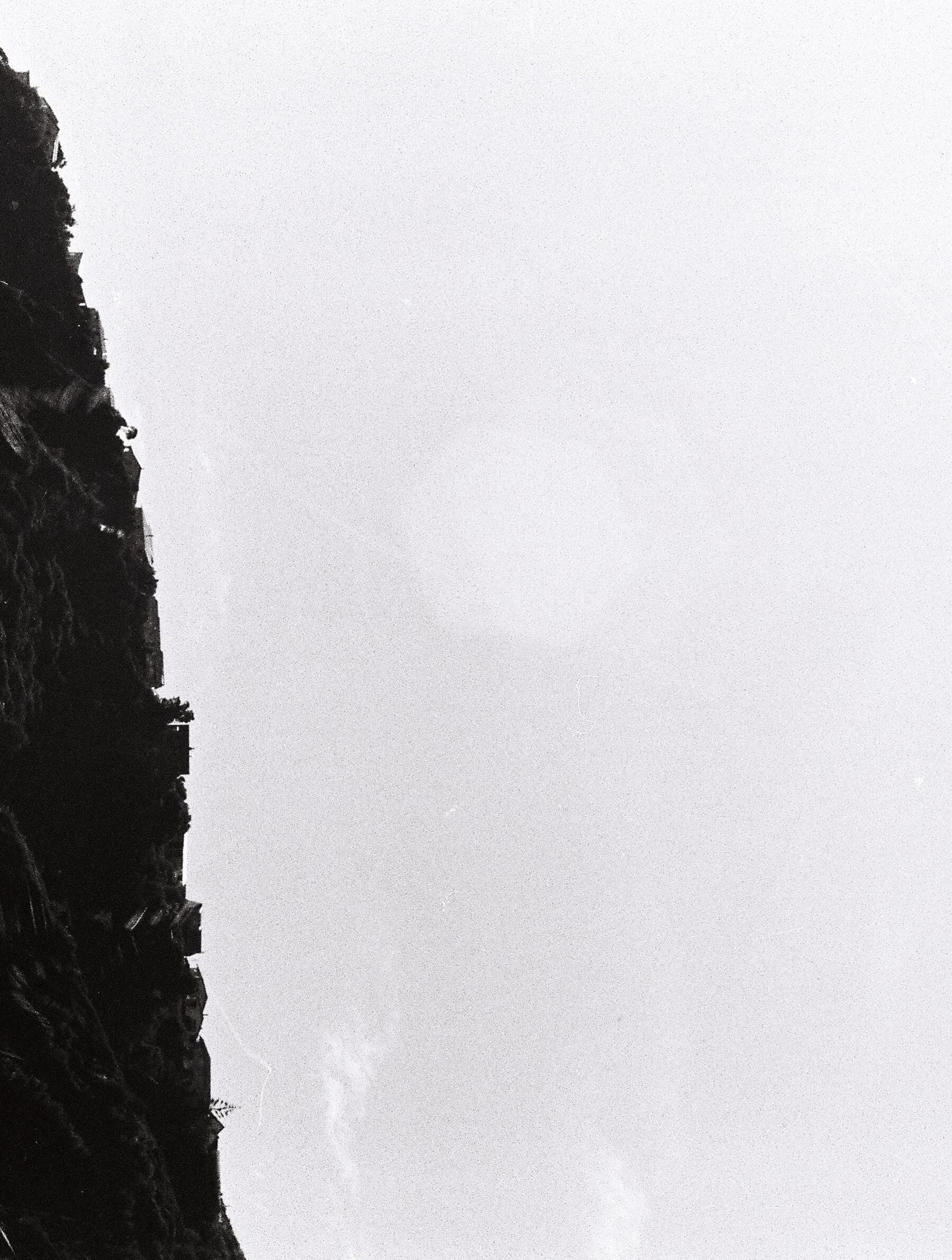
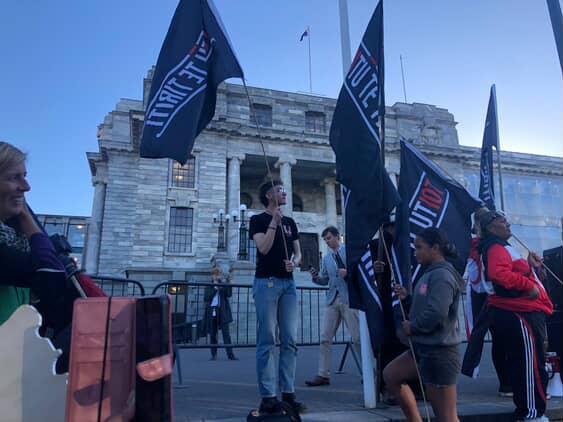


The FirstYears Guide to Protest
Te Urukeiha Tuhua (he/they/ia, Tūhoe)
So, we’re at university—what now?
By the time Trimester Two rolls around, many of us are already struggling: to pay rent, afford groceries (except for those of us in halls), or even load enough money onto our Snapper cards to get to class. There’s barely enough leftover for the real essentials (alcohol). That’s how expensive everything has become.
Meanwhile, our government seems intent on making things harder. Youth benefits are being slashed. Climate protections are being gutted. Te Tiriti is constantly undermined. There’s more—far too much to list here. If you’ve read this far, you’re probably feeling just as angry as I am.
Anger is a normal reaction to all of the shit happening at the moment; in fact, I’d be concerned if you weren’t feeling something
None of us should lie down and accept any of this. Change is possible, and it starts with all of us. The time is ripe for us to take collective action.
If the idea of marching in the streets feels daunting, know that you’re not alone. Many people feel anxious about sticking out in a small crowd, or worry that the protest itself will be ineffective. But here’s the thing: we’re in the capital city. Protests here regularly attract hundreds, sometimes thousands of people. Parliament is literally right down the road. Even if change doesn’t happen overnight, protests signal—loud and clear—what we expect from those in power. It is imperative that we get comfortable with protesting, because this is how we make our voices heard.
I’m not asking you to scream into david Seymour’s face with a megaphone (though it’d be fucking awesome if you did), and I’m not asking you to set anything on fire. Let’s start with small steps.
X “But protest doesn’t do anything…”
Yeah, I’ve heard this line and variations of it countless times. I’m gonna hold your hand when I say this: you are wrong, and you have a lot more power than you may think.
It’s human to feel helpless. Many of us care deeply for many different issues. That emotional burden—that flame that pushes us to act, but also threatens to burn us out—is real. Sometimes it is easy to fall into despair.
But you’ve gotta pick yourself up babe. Lean on your friends. Care for yourself and the people around you. Then figure out what you can do, instead of fixating on what you can’t.
My whānau have a friend in Palestine, Abdullah Elshafei. He recently told me: “Continue what you are doing. Believe me with what you are doing, it will end soon and Netanyahu will sit in prison. The occupation believes that all this injustice and killing it is doing will go unpunished, but the punishment came and the whole world knew that he was an outcast and will look to end the genocide soon. Everything you do we see, hear, and love.”*
Protesting works. It puts pressure on those in power and reminds them that they’re accountable. If they pass harmful legislation, they need to know they’ll face resistance—loud, visible, and unrelenting. Put the pressure on, and make sure they’re acting in ways that benefit all of us instead of just the wealthy few at the top. When we stand together united, we cannot be defeated.
X
Getting Yourself a Flag
Flags are easy to find, and a number of online stores stock them. The Flag Shop NZ offers a range of tino rangatiratanga, Pride, and Palestine flags, many priced under $20 depending on the size you’re looking for.
Tempted by Temu’s cheap prices? don’t be. It’s worth spending a little more to shop ethically, especially when your flag can be flown at almost any protest, time and time again.
Now that you’ve got a flag, you’ll need a solid flagpole to withstand the wind. Bamboo sticks work well, and you can buy them online or at Bunnings. But really, almost any stick will do. My mum sometimes uses her retractable hiking stick as a portable flagpole, and if you’re up for a bushwalk, you might even find a good branch.
It’s easier than you’d think to attach your flag to the pole. I found a cheap packet of zip ties at daiso on Manners Street, and that did the trick for me.
X Making Placards
While flags are an excellent symbol of solidarity, placards are an effective way to make a specific statement that is directly related to the issue you’re protesting. They also help inform the public by clearly communicating the cause.
The easiest way to make a placard is attending the sign-painting events hosted by VUWSA in the hub. Keep an eye on @vuwsagram; these events are usually advertised in the lead-up to major protests. It’s a great opportunity to connect with other people and to not show up empty-handed.
Most halls have a ‘mess room’ that are stocked with paint, cardboard and other supplies. If you can’t make it to a sign-painting event, get creative and make your own placard using what’s available.
Even if you don’t bring anything, he pai koe. There’s still a lot of power in showing up and making your presence known.


X Practical Considerations
It’s not a fashion show. dress comfortably and practically—unless we’re protesting transphobic legislation, then by all means, dress up. We all know that us queer folk are the most fashionable people in all of Pōneke. But as a side, do make sure you have shoes that won’t give you blisters!
Bring water and some panadol. It can get hot out there, and you don’t want your day to be ruined by a headache. Try and eat some kai beforehand for that extra energy. Sometimes there are time constraints when we race from a lecture to Parliament and then back again, so consider stocking your bag with snacks or even lollies for a quick sugar boost.
X Is my MP listening to me?
Being situated closely to Parliament means we often see politicians coming out and speaking to the public about the issues being raised. Pay close attention to what they say, and ask yourself: are they actually hearing and addressing the concerns of the people? Are they taking real steps to make change? Or are they side-stepping and trying to absolve themselves of responsibility?
Continue pushing your MP to represent you and the issues you care about. Lobby them, send them emails! You don’t need to be incredibly professional or use lots of academic jargon to tell an MP that you want them to support or oppose a certain bill. When an MP receives hundreds of emails urging them to support a bill, they’ll feel pressured to back it, even if it goes against their own political values.
And now that we’re finally 18—most of us, anyway—we can vote them out at the next election. Please enrol to vote! I seriously can’t handle another term with this fucking government.
X How do I find protests to go to?
Stay updated on different protests by following @vuwsagram; they regularly share info on protests to create a strong student voice. @falastin_tea_collective organises multiple actions each week for Palestine. For students, the easiest option would be the (almost) weekly Saturday protests at 1pm. The location can vary, so keep an eye on the Instagram page.
Lots of activist groups and public figures on Instagram share events and protests to their stories regularly. When you see one, save the date to your calendar and reshare the post to help spread the word. The more of us that show up, the better.
Ka whawhai tonu tātou, ake ake ake! See you in the streets diva.
*Abdullah and his daughters Swar and Musk have been living through genocide for almost two years. If you are able to support them, you can donate to 389007-0663465-22; account name ‘L JEHLE & S FERGUSON’. Every little bit helps, ngā mihi nui.
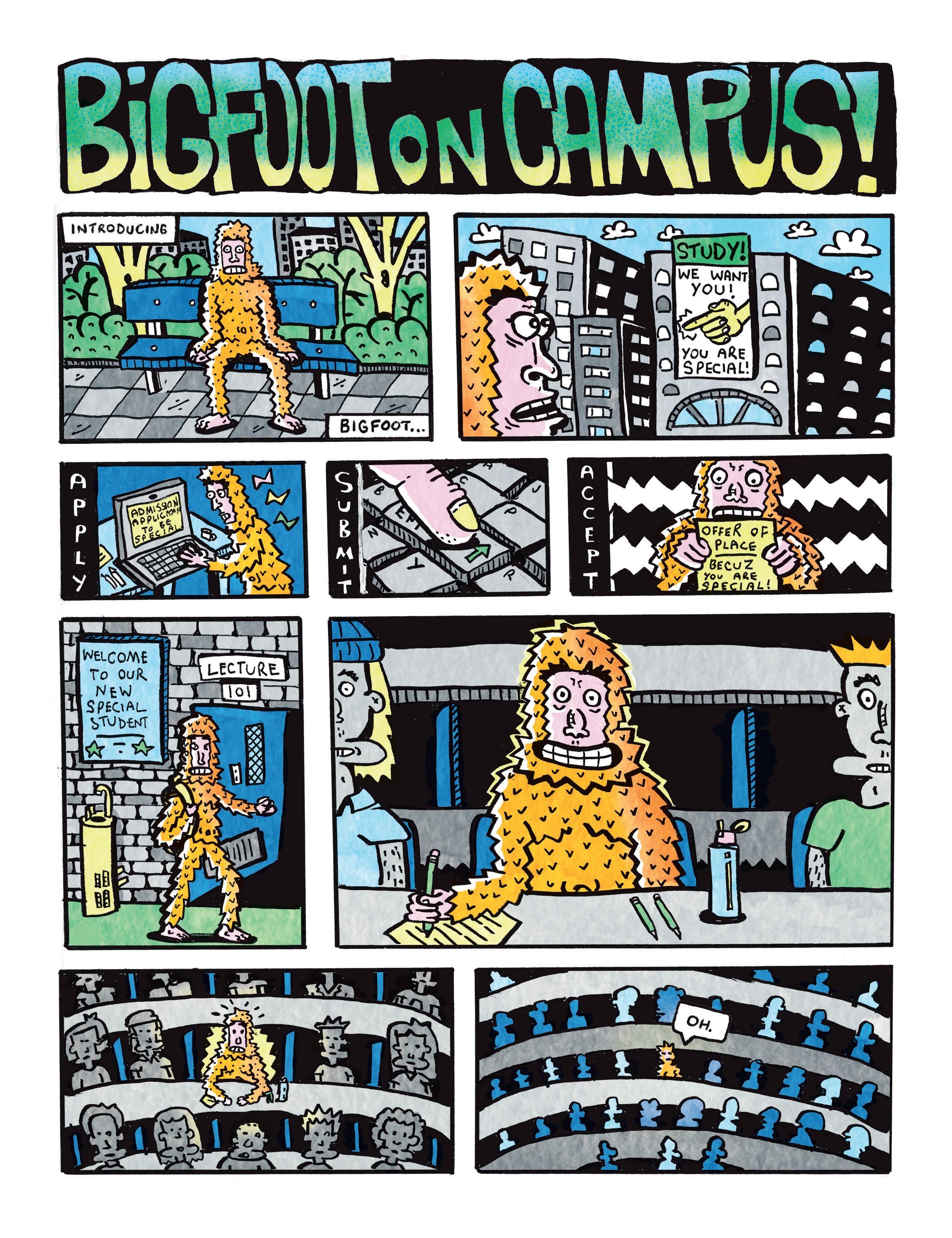
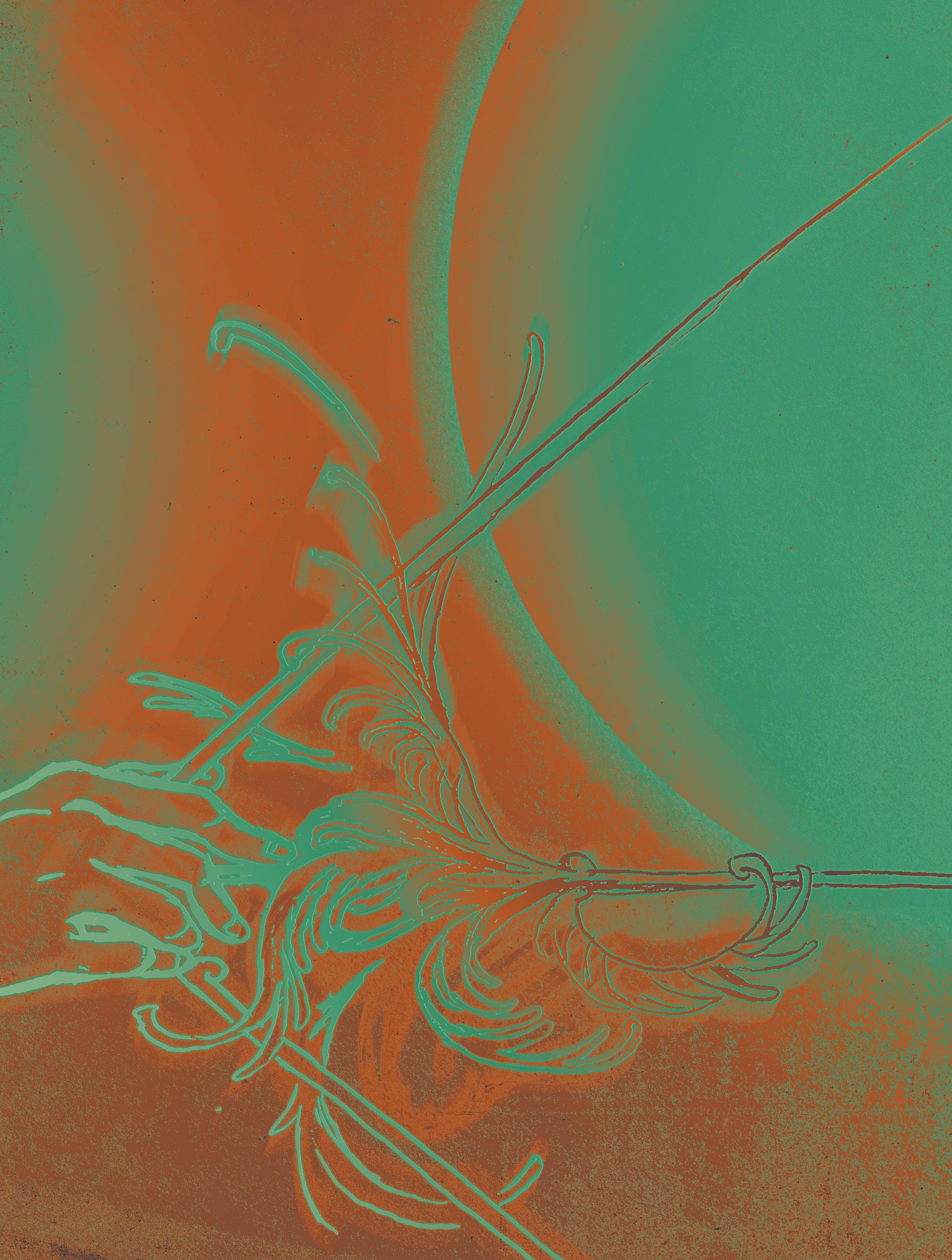
Deity and her The Devotee
drag of silk over skin— My fingers in your mouth, the rasp and scrape of your molars against the pad of my thumb. Wetness and warmth. Palms pressing dents into the corners and curves of you— my one unanswered prayer.
The slip of your tongue against the swell of my hip, and the way I’d become goosefleshed, shivering even as you melted me. I could be remoulded, reborn into the shape of something you’d permit to touch all that my hands are empty of.
Let me become your impetus— the thing that barstardizes you, unfurls you like a leaf in spring. Let me make you vulnerable, breakable. Let me break you as I have been broken beneath your honeyed gaze. Let me be the embodiment of all that you deny yourself.
Your presence pulls me taut— a bowstring.
But you are also the flung arrow: skin, blood, bones, buried marrow-deep.
If you would see me, I could show you. If you could just look at me— kneeling bruises into my skin as I bend like a willow at your feet.
If you would just look at me— God, if only for a moment— You would look at me like someone who is allowed to ask any of this of you at all.
Chloe Hope (she/her)
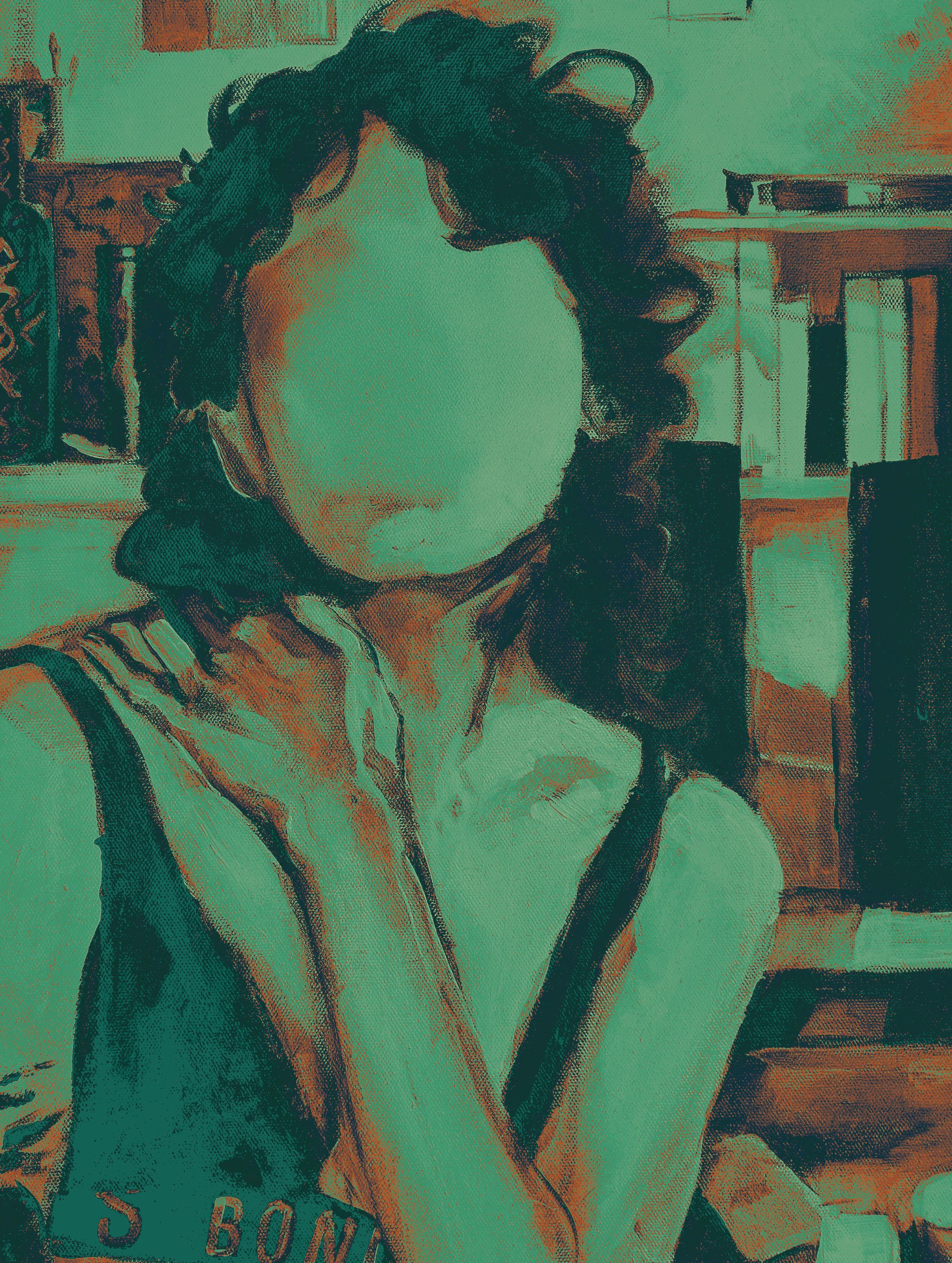
AP ortrait poetry You of
You painted me the other day. A flurry of reds and oranges wove through my hair. Greens and blues filled the spaces around my hands, clutching that silly stuffed penguin I gave you.
I can’t paint—not like you. I tried once. My hands trembled. All I gave you was a thin, scratchy portrait. Clearly, art school is not for me.
So instead, I write. If those who can’t do, teach, Then perhaps those without words, write. This is how I’ll reach you.
You paint with such color. Your strokes are alive—vibrant. Even your mistakes seem to breathe. How can my words carry that same intensity, The passion of your brushstrokes that set the canvas alive?
I search for the right words— perfect phrasing, fitting metaphors. But I wonder if the love I offer will ever match the depth and intensity you pour into each brushstroke and gift back to me.
How can I match your swirling arcs and hues, the way you create with such a sweeping colour? So instead, this is my written portrait of you— the only way I know to capture it.
Ryan Cleland (he/him)
SnailsHarper and the poetry
For Renée
It was late— too late for both of us to have work the next day. (How will the government keep running when you’re tired?)
We sat on the steps of the flat, watching Harper run about. I played with her on your floor, pretending not to notice you watching us.
Harper wrestled me. I wrestled back. You said I was winding her up before bed. I said, ‘Good.’
We stared at the snails as they climbed the walls. We stared, and I wondered what they saw staring back at us.
You told me to throw my cigarette in the jar. I missed. Maybe I hit a snail.
You threw yours— and it set the house on fire. (Joking.) You missed too.
When I woke in the night, Harper had sandwiched herself between us. In the morning, she was on top of me.
When I left, there were no snails around.
By anonymous

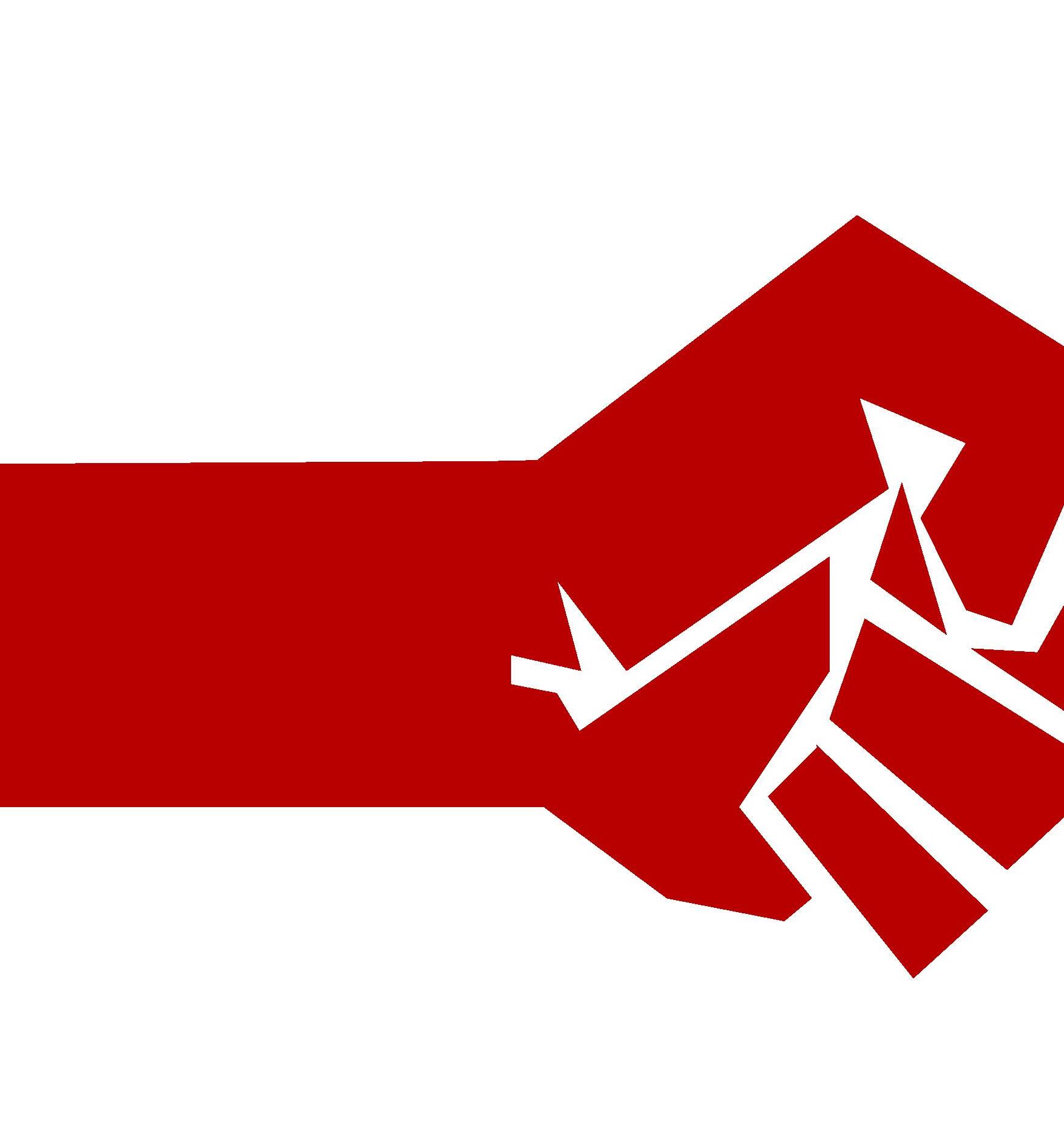
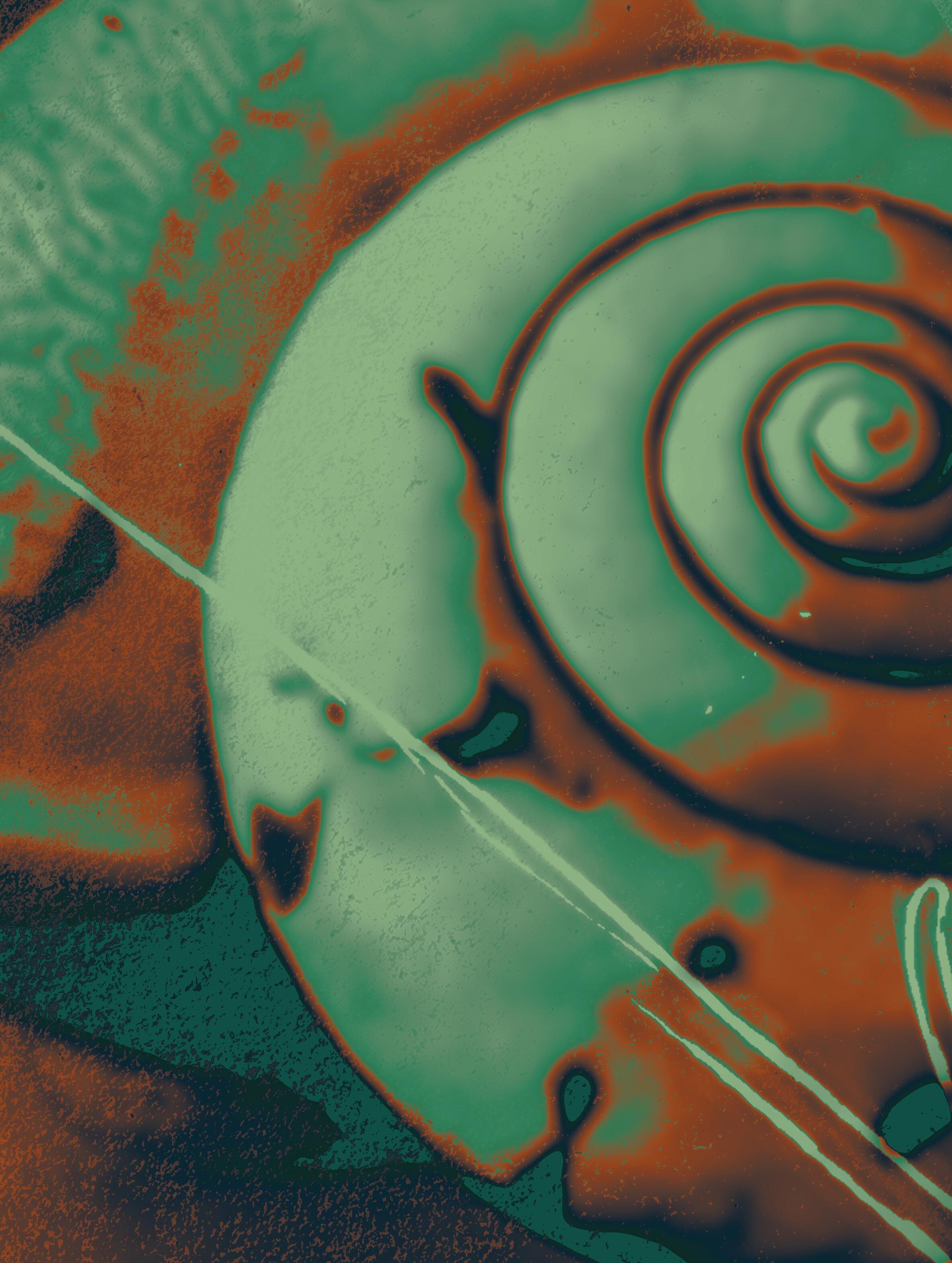

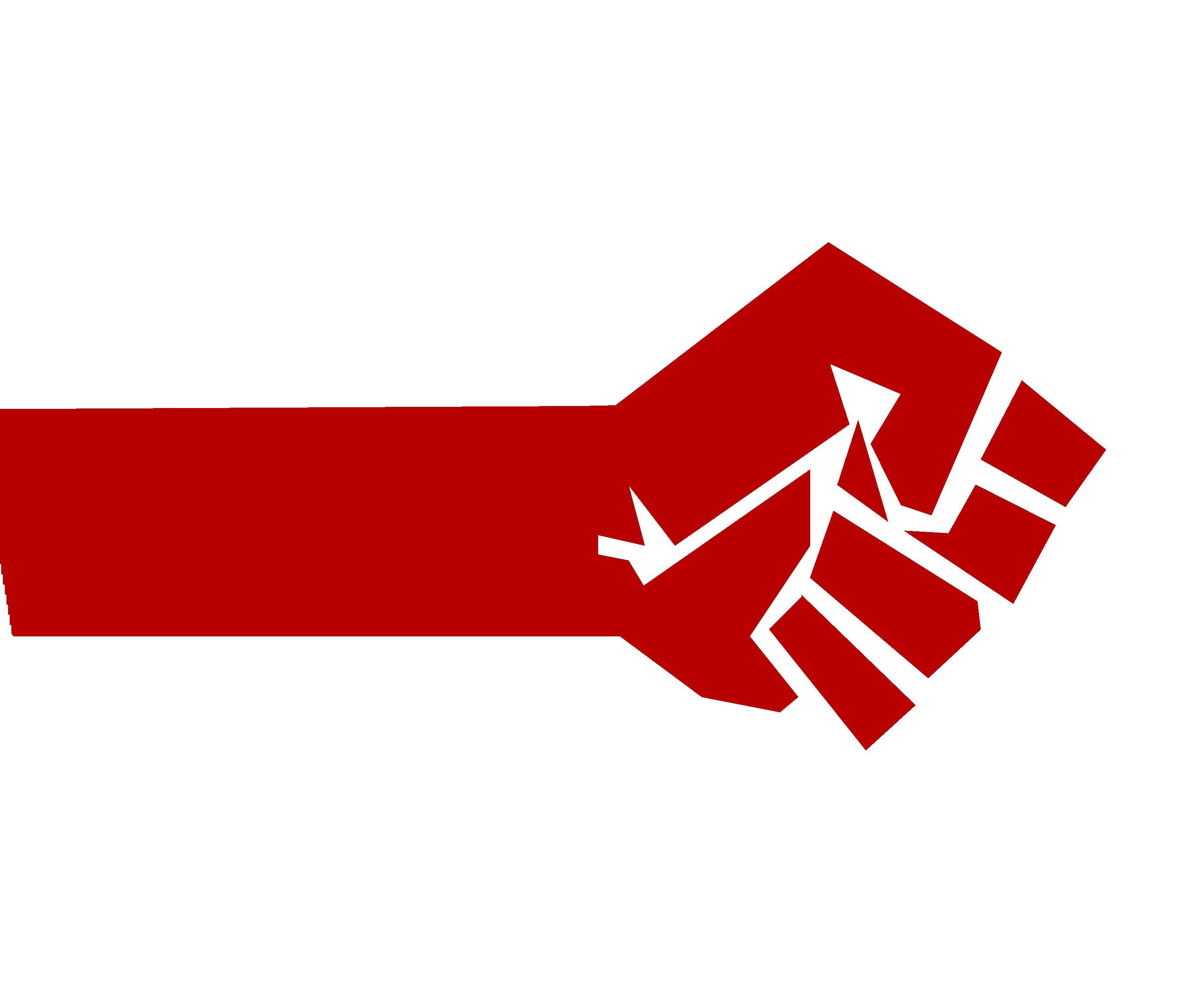
SOC101
It’s Right to Strike!
By VUW International Socialists / ISO
Last month more than 36,000 nurses, midwives, health care assistants and kaimahi hauora voted to strike for 24-hours after an insulting offer from the government.
The offer for their new collective agreement? A measly 1 percent payrise and a complete failure to address safe staffing issues. Because this pay “rise” is below inflation, it’s really a pay cut in real terms. Meanwhile, continued understaffing will mean more nurses stretched thin, and more patients put at risk.
As the nurses union (NZNO) Kaiwhakahaere Kerri Nuku explained last September, “our health system is in total decay, and as nurses we grind ourselves to a pulp to try to fill the gaps. We are pushed and pushed, to tears, to breaking point, to burnout or worse, and still we’re utterly devalued and sidelined.”
The working class always absorbs the shocks of capitalism in crisis, and strikes are one of the most effective ways of fighting back. Every strike reminds the employer who really makes the wheels turn, and reveals to the workers their collective power.
In this way, strikes are not just means to win—they are victories in themselves. In practical terms they teach us how to write effective slogans for picketlines, perform speeches at rallies, and make political arguments about our jobs. In deeper ways, they build class confidence and strengthen solidarity.
Thanks largely to the Employment Contracts Act 1991 and Employment Relations Act 2000, which both delivered devastating changes to workers’ rights, many of these lessons have been lost. Where workers throughout the 19th and 20th centuries struck to oppose racist pay gaps, military conscription, and collaboration with apartheid South Africa, strike activity in recent decades has hit record lows.
Today it is legal to strike only during collective bargaining (after 40 days, and if a majority of union members vote in favour) or over workplace safety concerns. Striking over political issues, disputes such as sexual harassment, or in solidarity with other workers, is illegal.
Illegal strikes—called wildcat strikes—however, can still happen. In 2002 wildcat strikes by high school teachers all across the country won a vital campaign for more non-contact hours, better pay, and increased allowances. Amid fears of further strike action, threatened court action against the teachers was dropped.
The nurses strike is another boost to our confidence. With the government slashing health funding and propping up big business, united workers can force them to concede. And what can students do? Show up on picketlines, make connections with strikers, and spread the word in your classes or workplaces. We have a chance to make striking a part of the future.
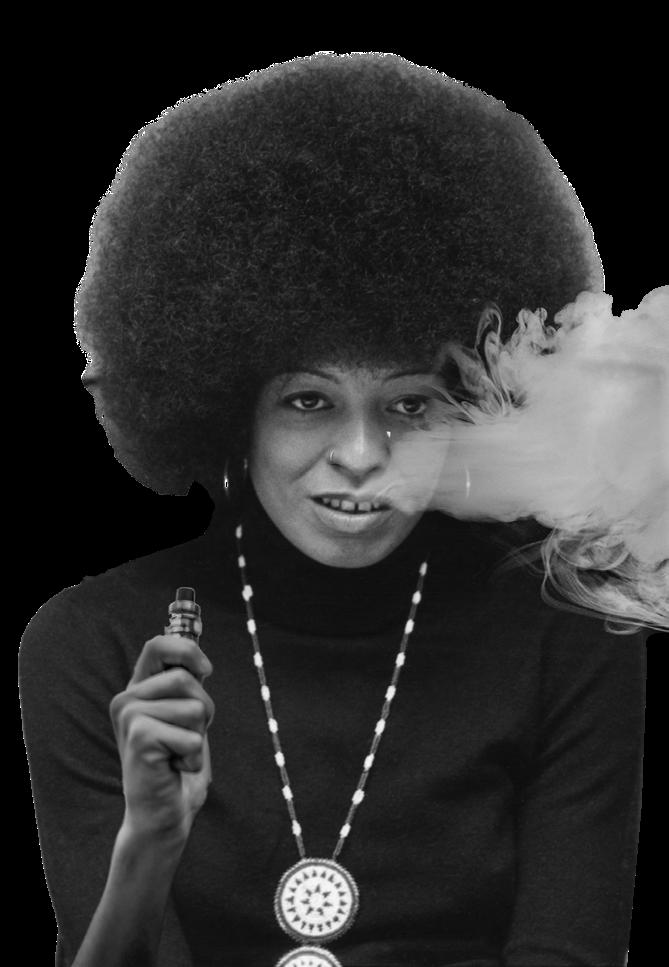
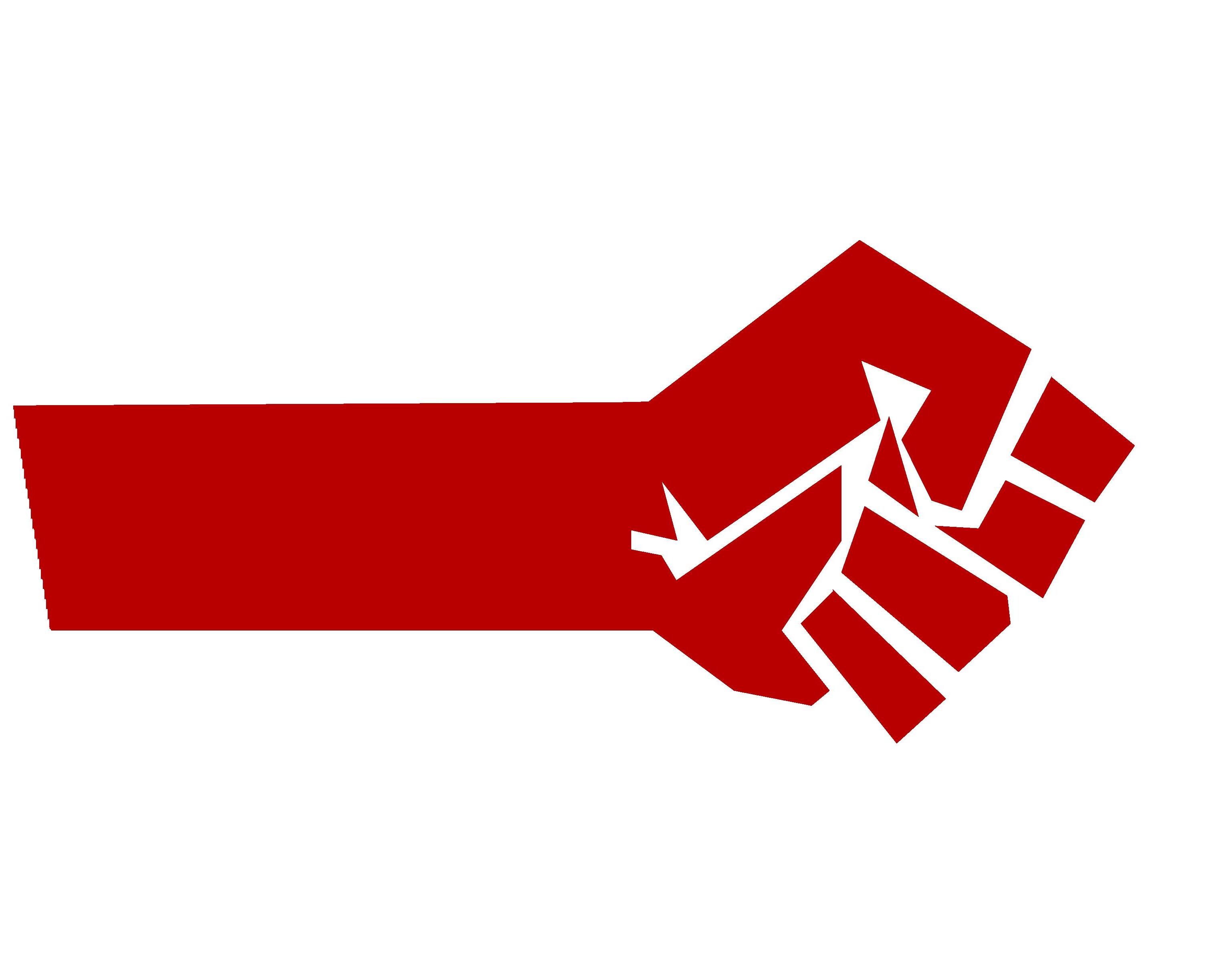

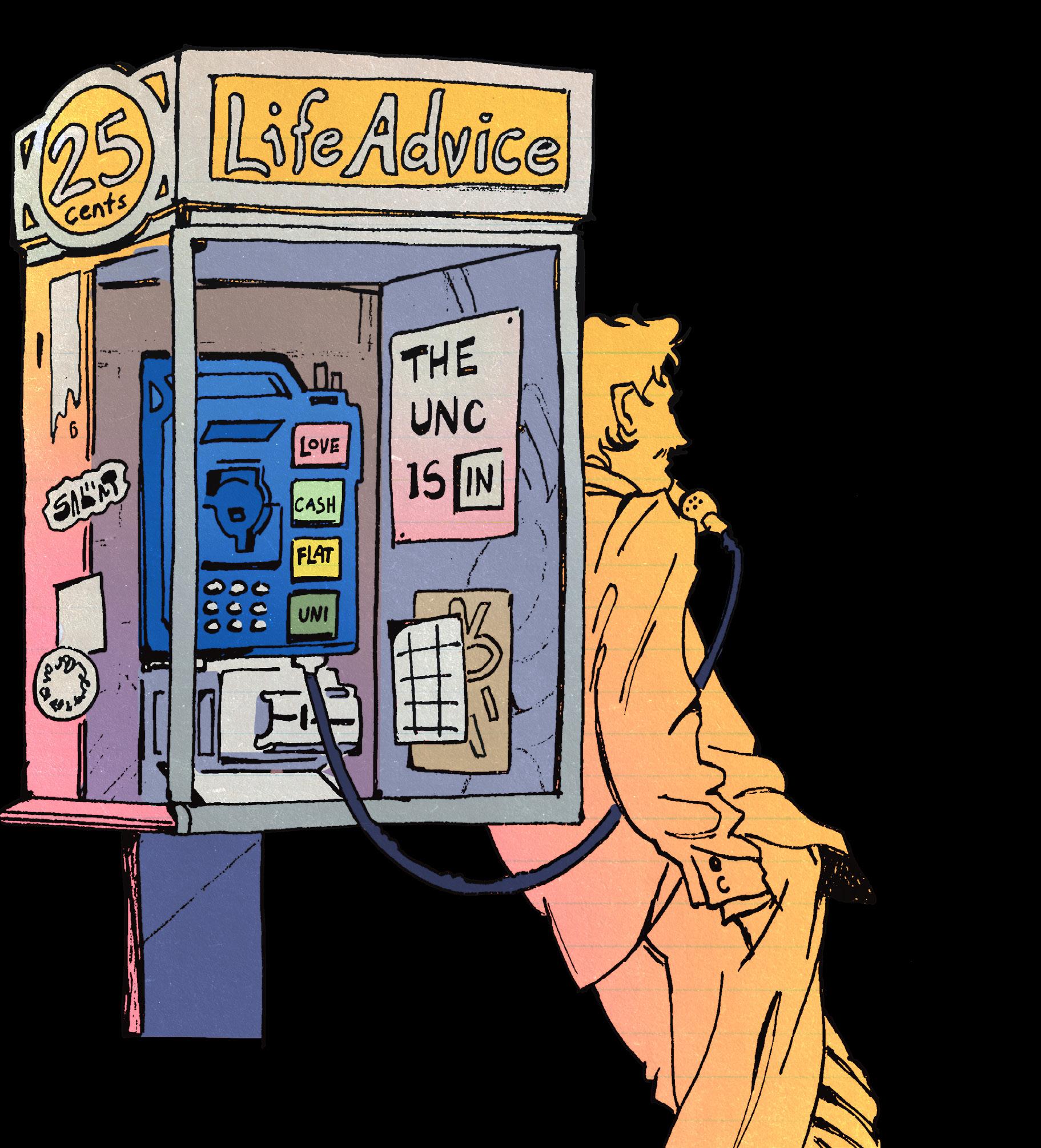
Ah, the mid-degree crisis—a proud tradition right up there with oversleeping lectures and pretending to understand Student Finance when they tell you to stop spending money on maccas and The Lab’s nine dollar coffees.
So, here you are: knee-deep in your second trimester, staring at Mydegree like it’s an ancient rune, and realising that maybe, just maybe, you don’t actually want to spend the rest of your life talking about the Freud or coding Java or pretending to care about GdP.
And now you’re panicking. Because switching majors now doesn’t just mean tweaking your academic plan—it means possibly throwing away a year. A whole year. Twelve months. Thirty-something weeks of awkward tutorials, overdue readings, and that one class where someone always has a strong opinion about Marx.
Let me be blunt: if the thought of continuing your current major makes you feel like you’re slowly calcifying from the inside out—good. That means your brain still works. It’s telling you to stop wasting time trying to care about something that bores you more than a hall party at capacity with no beer.
Here’s the thing they don’t tell you at course planning: most people don’t finish their degrees
Agony Unc(le)

I think I want to switch my major, but I’m scared it’ll mean I’ve wasted a year and fallen behind my peers.
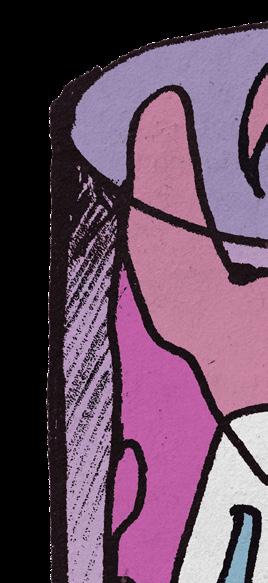
in three tidy years. Some take four, some take five, some disappear halfway through to become yoga instructors in Tāmaki Makaurau. Time isn’t the enemy here—regret is.
You didn’t waste a year. You spent a year figuring out what you don’t want. That’s not failure—that’s education. And I promise you: no one is actually ahead. Your “peers” are out here switching majors, failing papers, questioning their life choices in the Hunter Building toilets. Some are still trying to remember how to write an essay that isn’t a ChatGPT hallucination.
Switching now isn’t the end—it’s the start of finally not hating every lecture. So, do it. Change course. Be brave. Because forcing yourself to trudge through two to four more years of “sticking it out” is like committing to a bad haircut just because you’ve had it since O-Week.
And if you ever feel lost, remember: your Uncle did three different majors, two questionable minors, and once enrolled in an elective just because the lecturer had a nice voice. Still turned out employable-ish.
Ready for the next bout of existential dread? Agony Unc(le)’s inbox is always open. Bonus points if it involves romance, rent, or whether a $14 flat white is a crime.
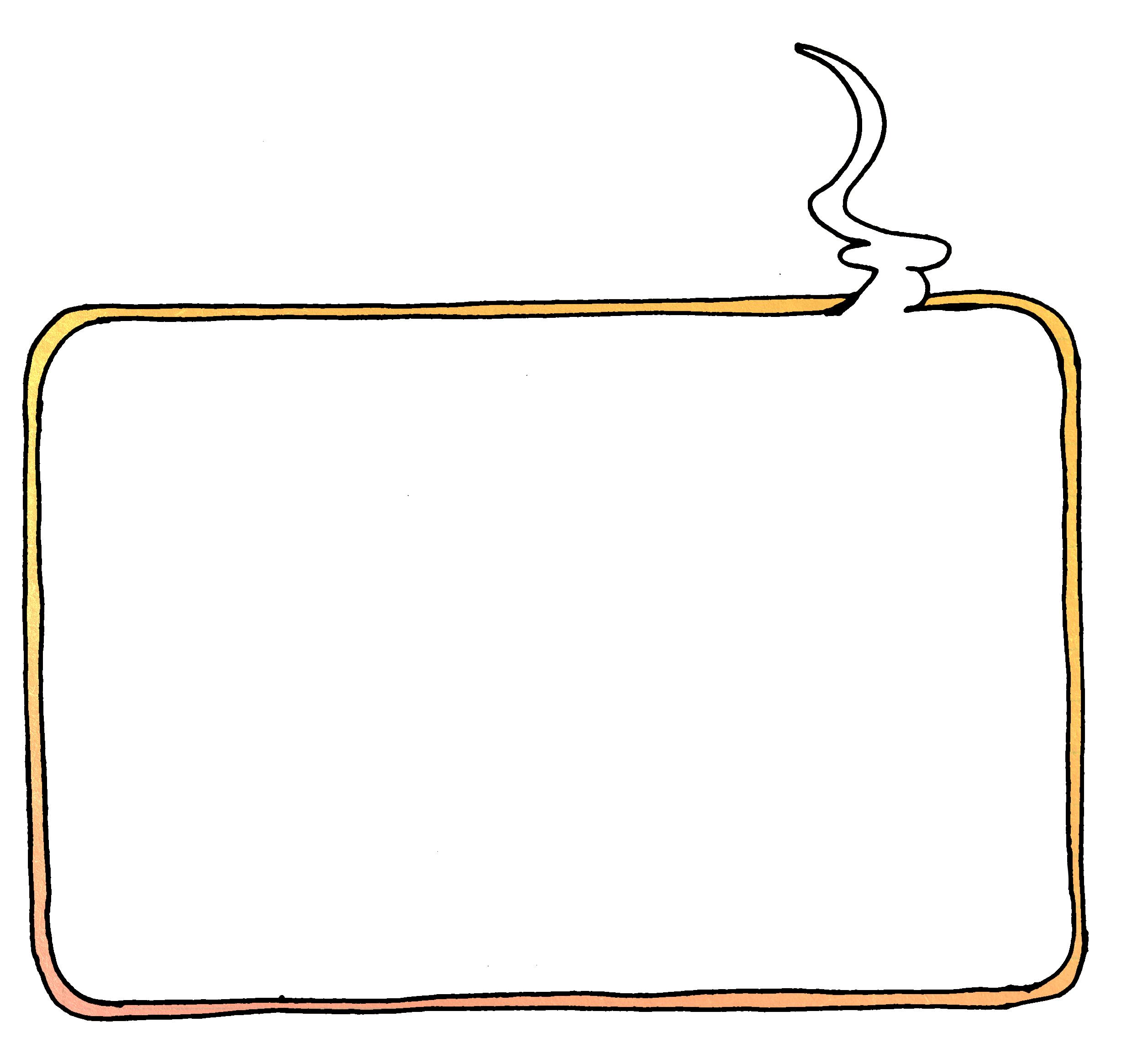


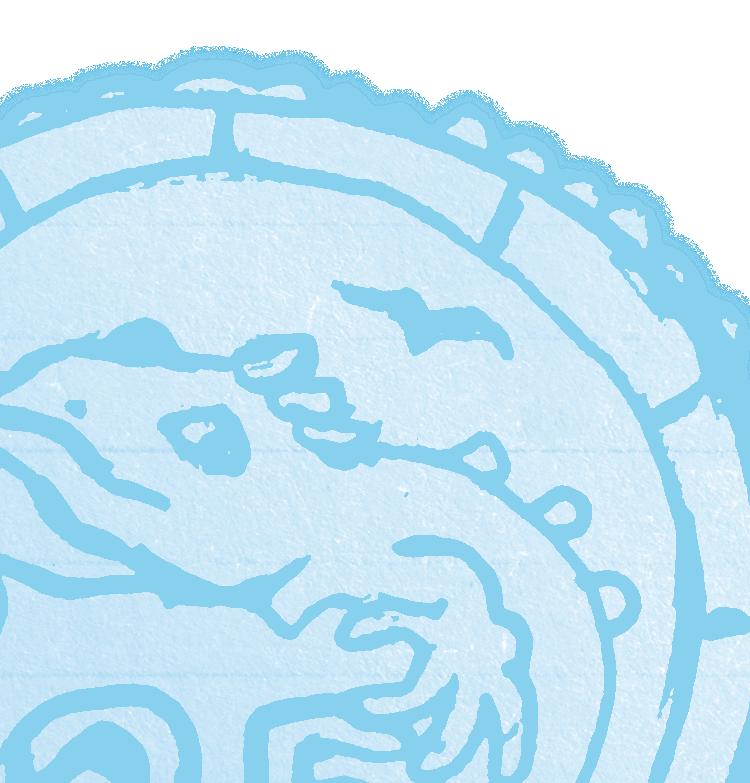
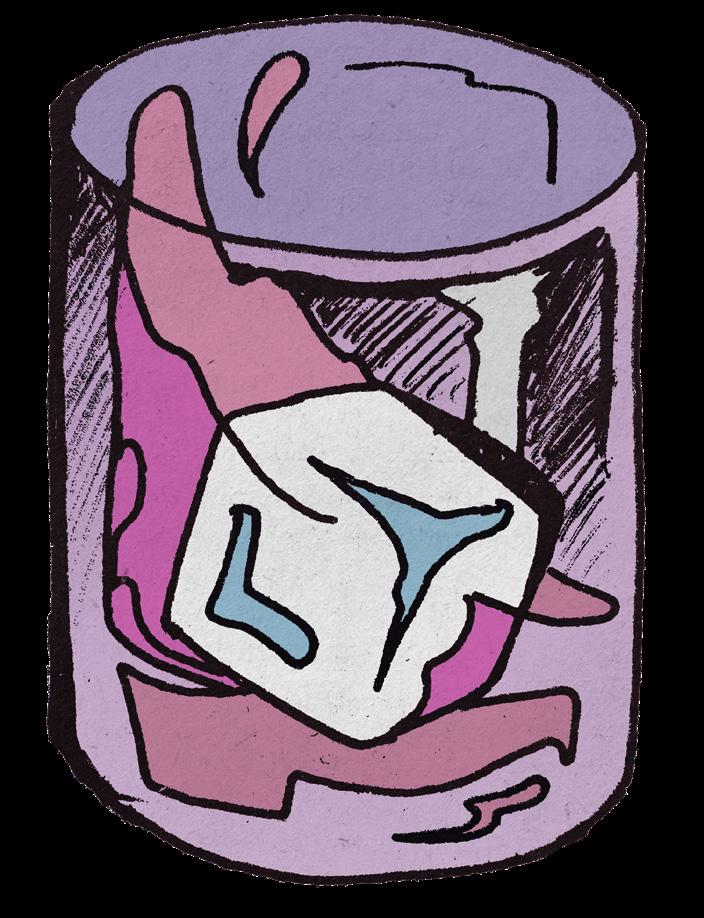
Georgia on the Rocks
Mocktail Review
Free AF’s Alcohol-Free Dark & Stormy
Rum has long been my liquor of choice—warm, dark, and perfectly paired with a crisp diet cola. Remarkably, those same qualities seem to have found their way into Free AF’s alcohol-free dark & Stormy, a spiced rum and ginger cocktail enhanced with the brand’s signature Afterglow.
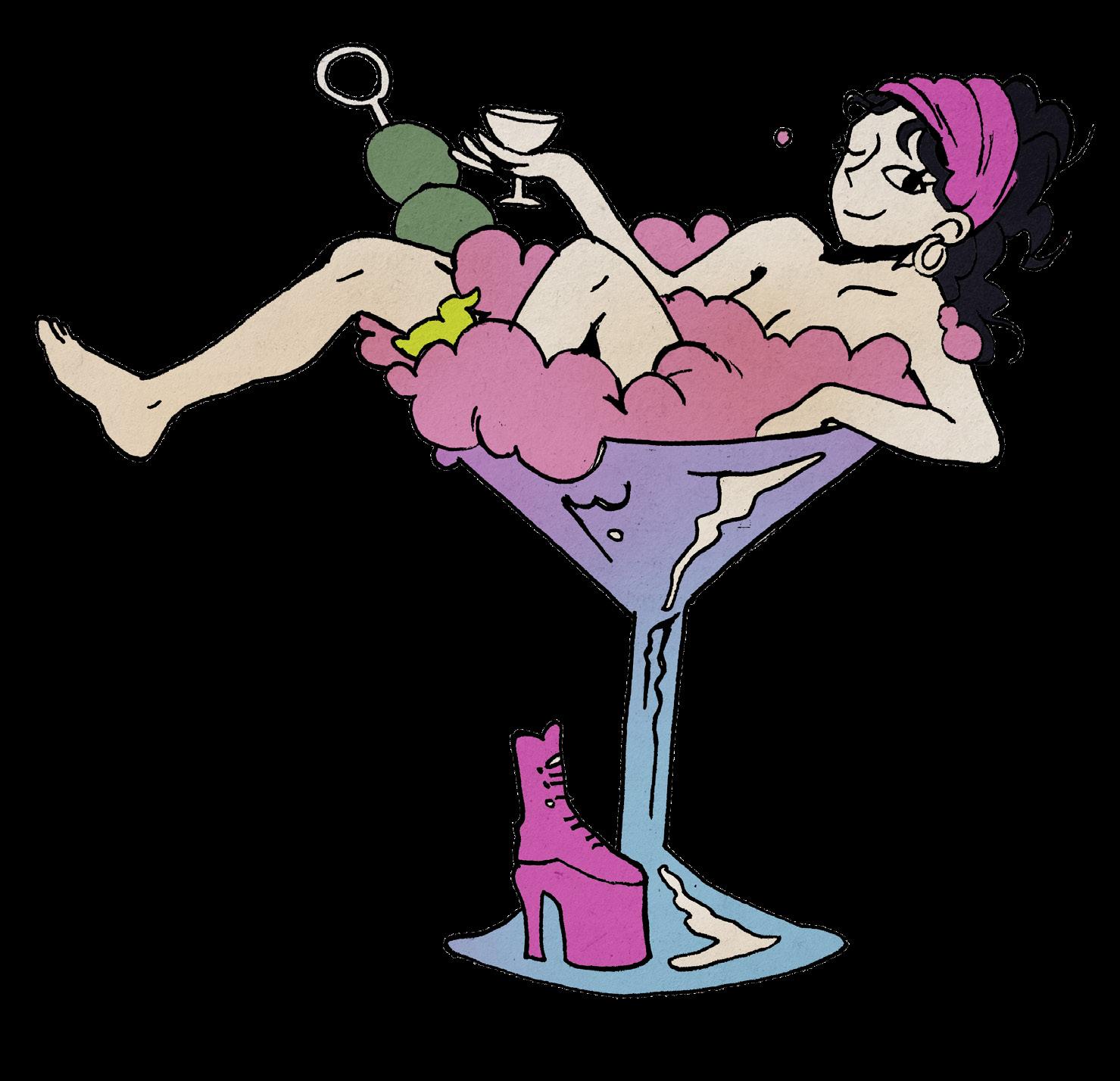
Party culture Highlight
Liver Support for the Modern Student
Afterglow, a trademarked ingredient derived from capsicum, is Free AFs’ answer to the missing buzz. It’s designed to mimic the physiological effects of alcohol by activating similar receptors in the brain, releasing dopamine, boosting circulation and— according to the brand—delivering “your brain’s natural high.” The goal is not just to replicate the taste of alcohol, but the experience of drinking it.
Visually and aromatically, Free AF’s drinks pass the party test. Leave a can unattended and chances are someone will mistake it for the real thing. But that authenticity comes at a cost—both literal and figurative. At $16.99 for a four-pack, it’s priced on par with traditional alcoholic RTds. And while it may chemically simulate the effects of alcohol, the taste leaves something to be desired. It’s not unpleasant, but it’s not exactly delicious either.
Unlike non-alcoholic wines, beers, or RTds from established brands that blend seamlessly into social settings and are often more affordable, Free AF’s offerings feel more like a novelty than a sustainable alternative. They deliver on sensation, but perhaps not value.
When it comes to navigating the epic highs and lows of student nightlife, Hundy and its budget-friendly counterpart Myrkl might just be the best addition to your next pre’s and post night-out routine. These natural liver supplements are designed to aid detoxification and recovery, helping to reduce the long-term effects of alcohol—and crucially, the dreaded hangover.
Both products work by breaking down alcohol more efficiently. For best results, take Myrkl one to two hours before drinking, or pop a Hundy before bed. Realistically, though, who’s going to remember to take two raisin extract capsules with their earlymorning takeaway before collapsing into bed?
Still, whether you’re prepping for a big night out or recovering from one, Hundy and Myrkl offer a fasttrack to feeling human again. For students juggling Wednesday bar hops with Thursday morning lectures, they might be the difference between showing up—or sleeping through.
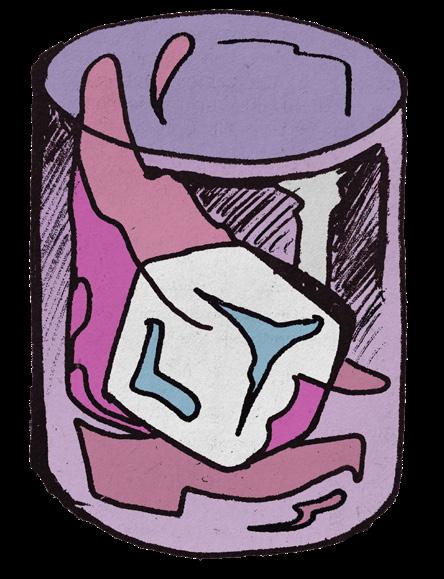
ACROSS
1 Brand name remedy for travel sickness (6)
4 University workshop (7)
7 Simu from Barbie and Shang-Chi (3)
8 Springy toy (4)
10 You can beat it (4)
12 Gets older (4)
13 Actress Witherspoon (5)
15 Thought (4)
17 Historical period (3)
18 Author Rand (3)
19 droops (4)
21 Brush (5)
23 Checks out (or what does the checking out) (4)
24 Complete mess... maybe involving the shaded entries? (6, 9)
29 Qualified (4)
30 Bakery purchase (5)
32 Hew (4)
34 Pub order (3)
35 In the past (3)
36 Cut, as logs (4)
38 Took again, as an exam (5)
41 Māori demigod who slowed the sun (4)
42 Rim (4)
43 Internet sensation (4)
44 Sass (3)
45 Harry Styles hit & Spotify's most-streamed song of 2022 (2, 2, 3)
46 Word for "solar" and "nervous" (7)
DOWN
1 Green side dishes (6)
2 Expires (6)
3 ___ gin fizz (4)
4 Soap bubbles (4)
5 About to occur (8)
6 Skin woe (4)
9 Handsy (6)
11 Paper stack (4)
14 Self-importance (3)
16 Fiery crime (5)
20 Play part (3)
22 Porridge grain (3)
24 Picket line crossers (5)
25 Most tidy (8)
26 dame counterpart (3)
27 Modernise (6)
28 Singer Yoko (3)
30 Ice____ (4)
31 Some music releases, for short (3)
32 Charge (4, 2)
33 Puts on a coat (6)
37 Top poker pair (4)
39 Slippery fish (4)
40 Electric guitar boosters (4)

Puzzles!
By Nil
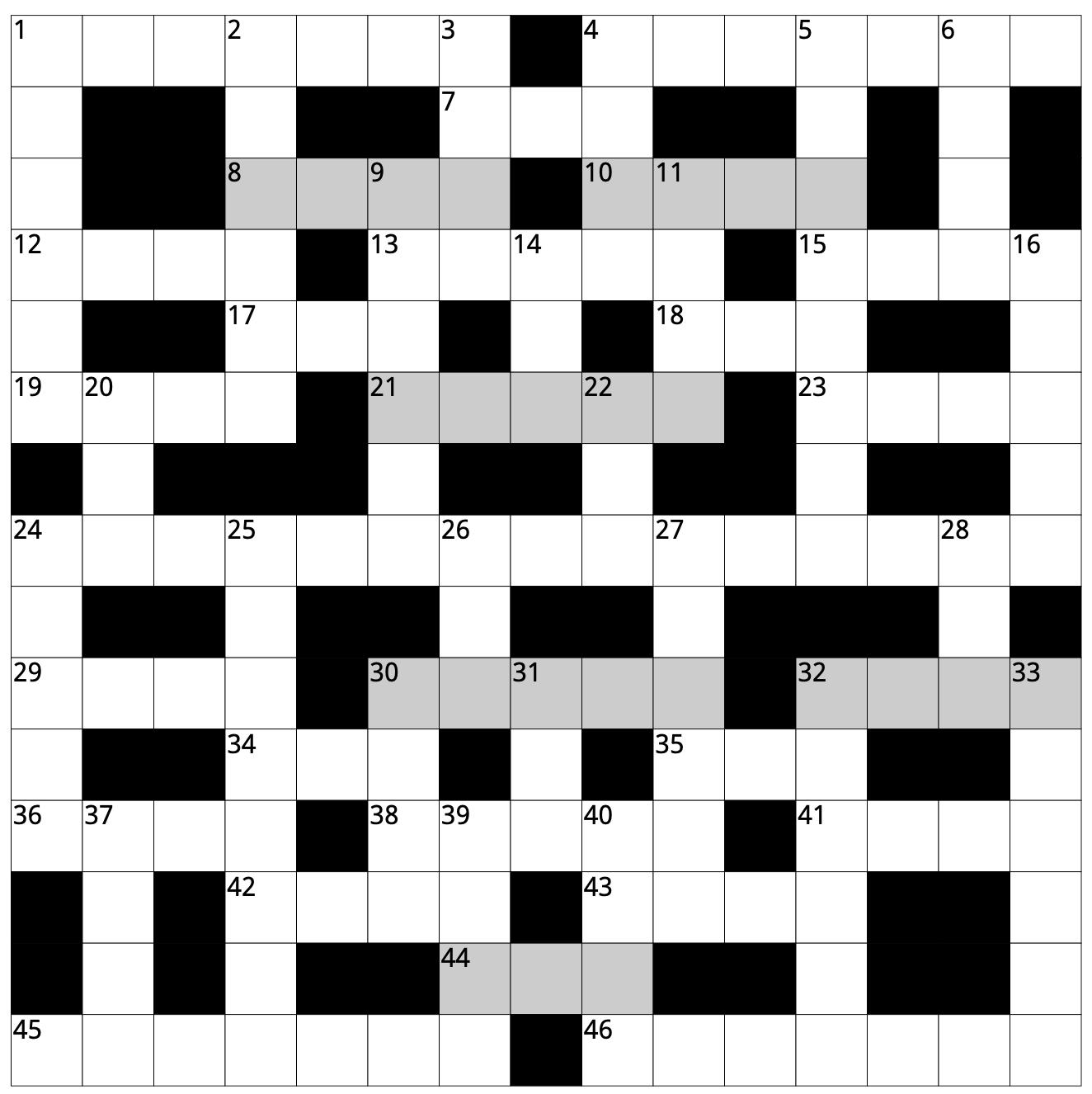


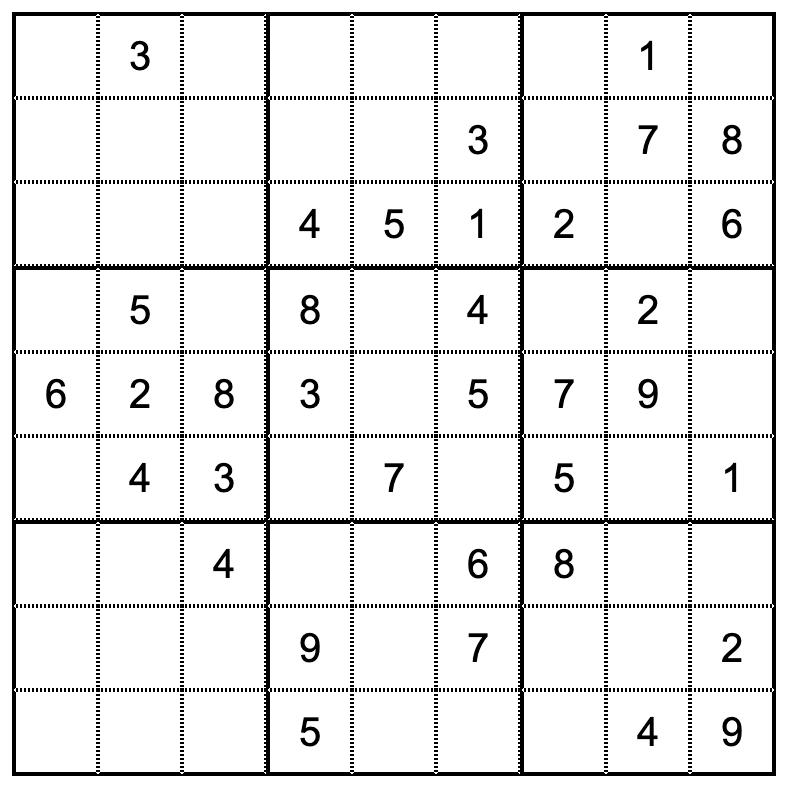
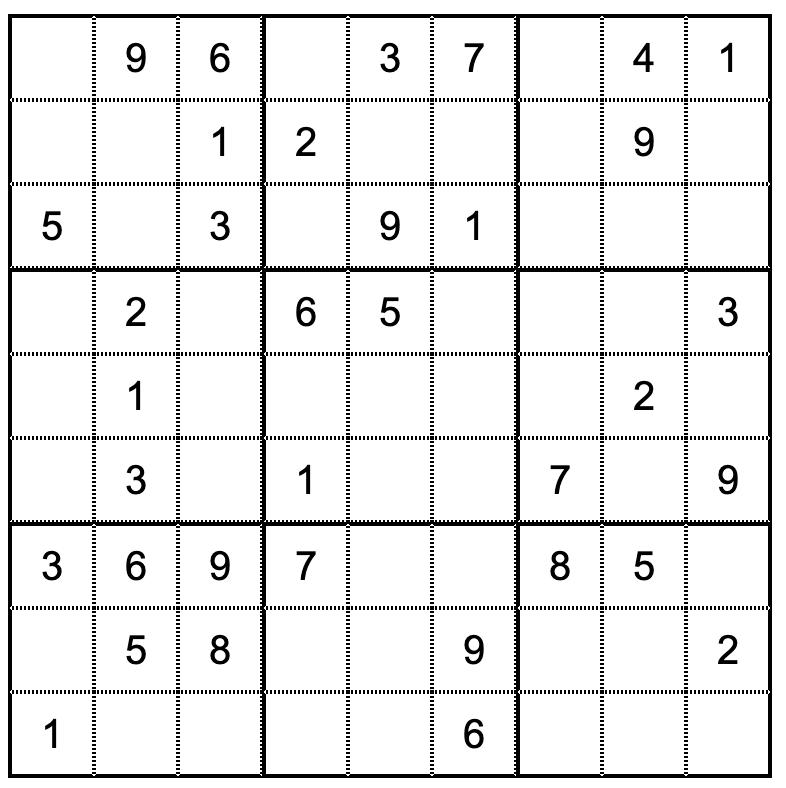
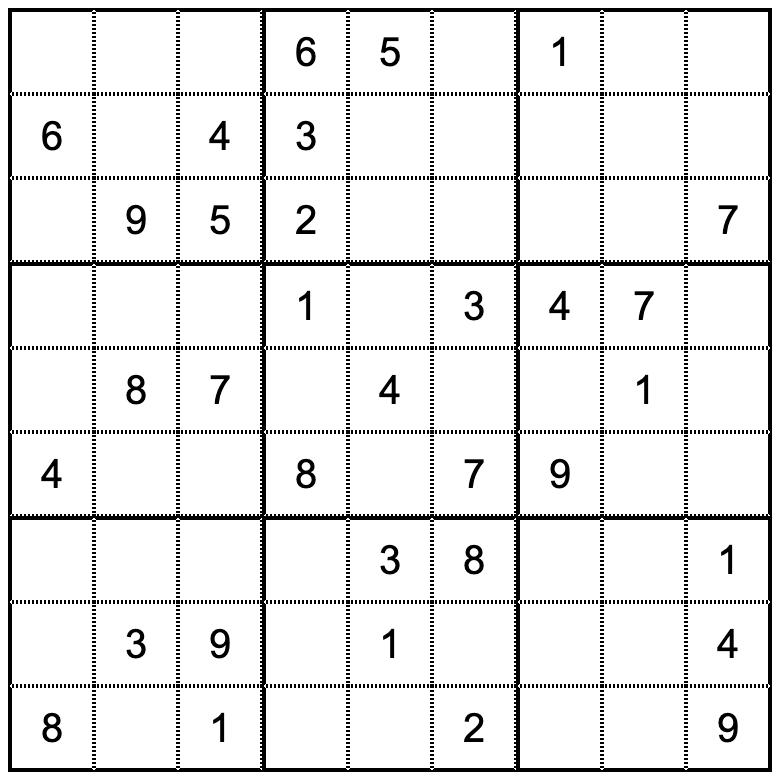
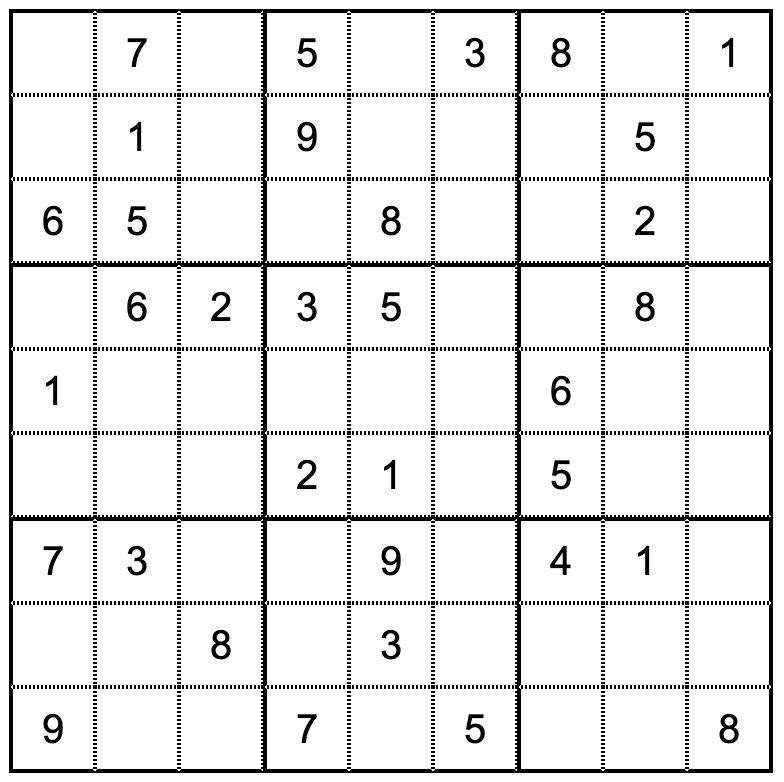
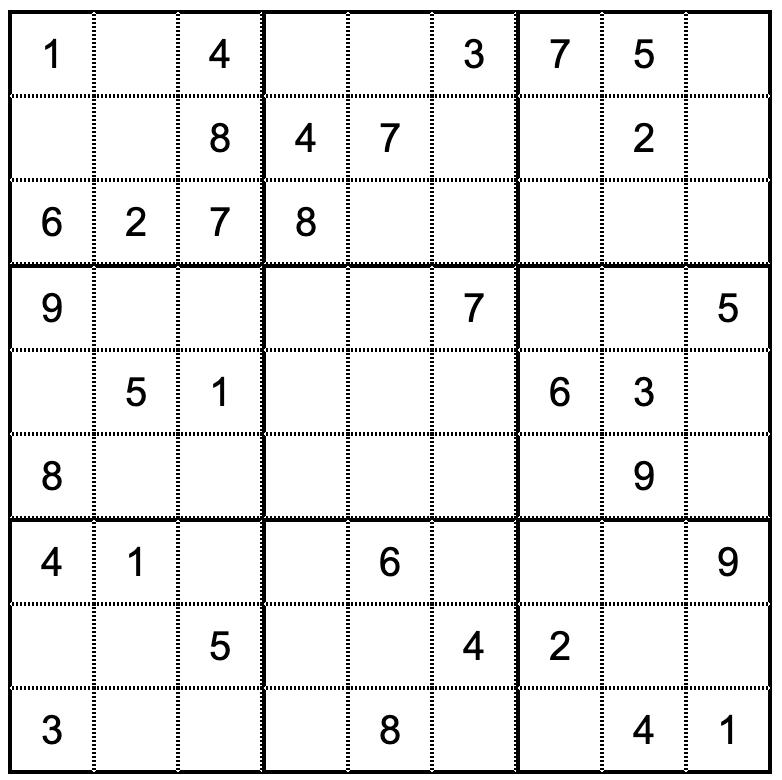
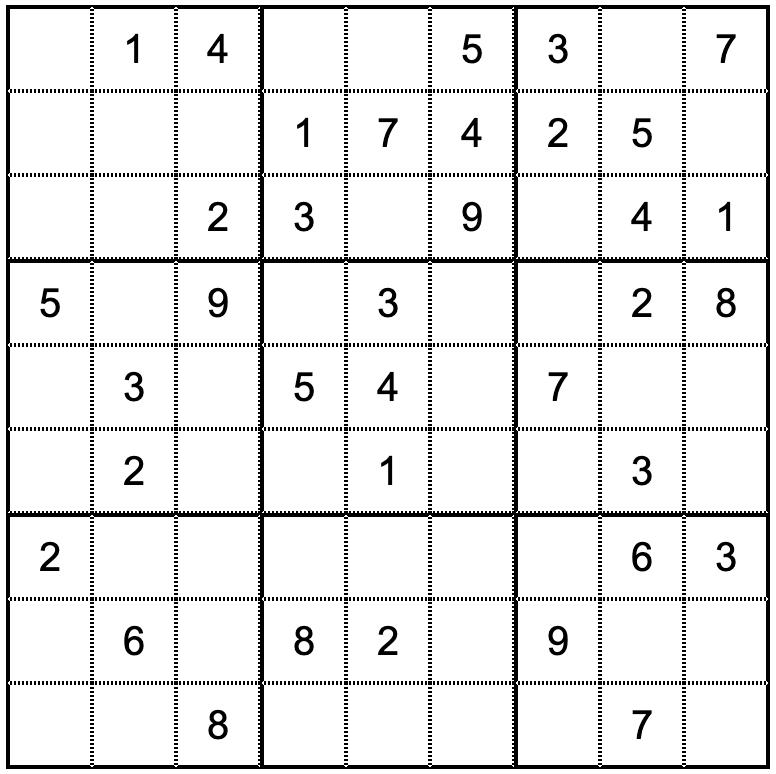


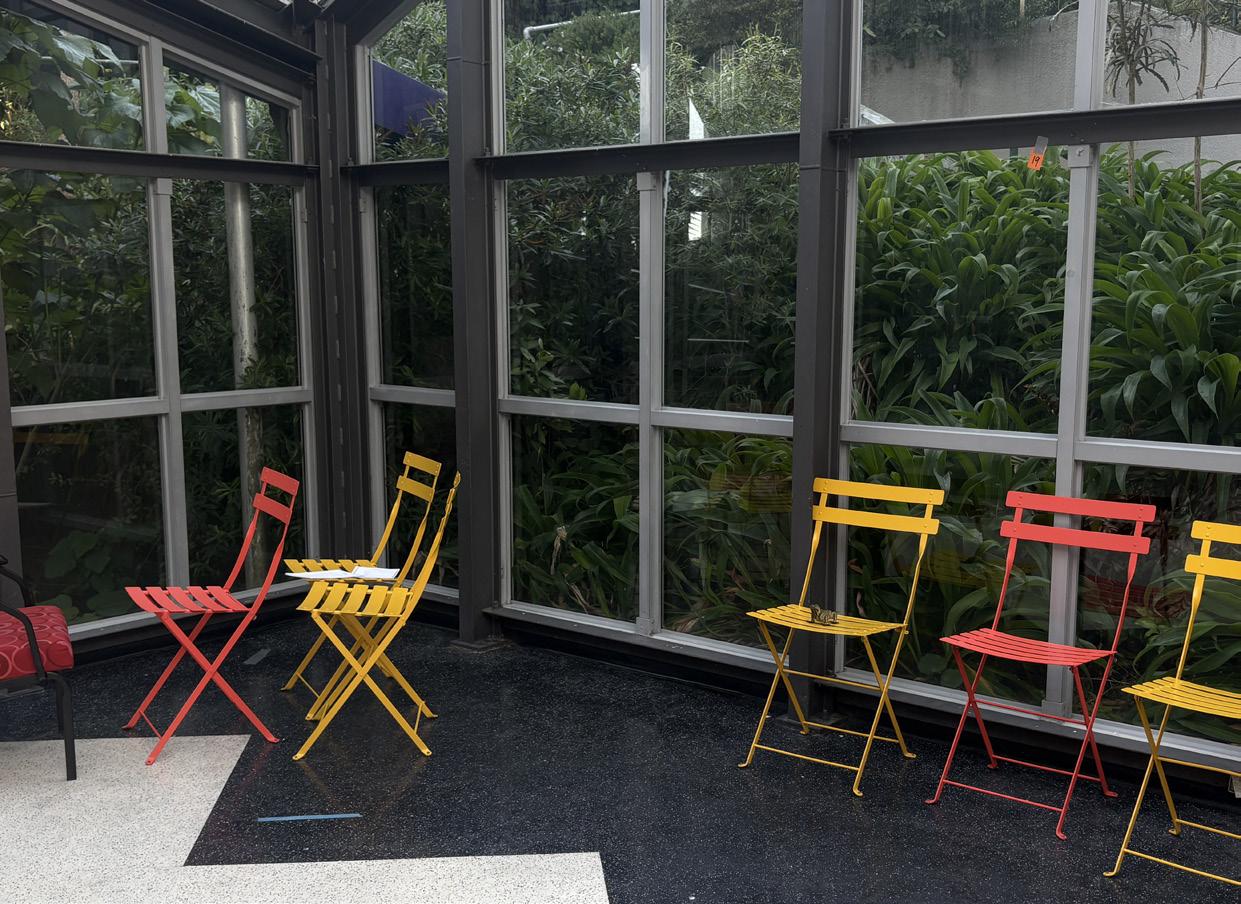
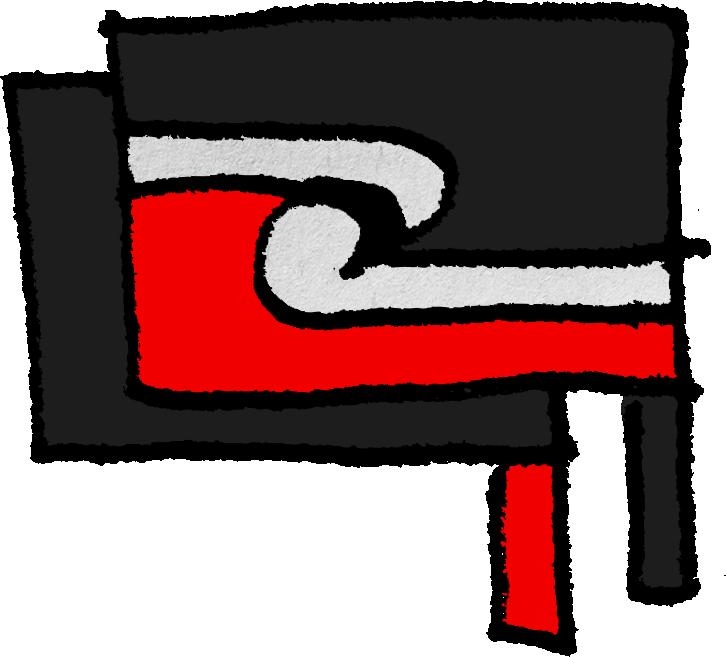

Kai and Kōrero: How Food Fuels Change
Life can feel a bit overwhelming these days. But sometimes, the simplest acts, like sharing kai, can help.
Kai is woven into our most meaningful moments: blowing out candles on a birthday cake, lingering over coffee with friends, or stretching lunch into an all-day affair when the whānau gathers. Food bridges gaps. The phrase “breaking bread” exists because sharing a meal builds trust - whether forging new bonds or healing old rifts.
These bonds can help us in a number of ways, though its relationship to political change might not be so obvious.
Community psychologists, like Catherine Campbell at the LSE, studied three examples of marginalised groups who were successful in influencing political change. Her team analysed three movements:
• Brazil’s Landless Workers’ Movement: won land rights for farmers from large land owners
• India’s People’s Health Movement: fought neoliberal healthcare policies and made healthcare more accessible to struggling communities
• South Africa’s Treatment Action Campaign: secured HIV/AIdS medication for all. despite different contexts, they succeeded by:
• Building shared narratives (framing issues as systemic, not personal failures).
• Leveraging relationships with allies in media and influential political actors
• Making moral arguments (e.g., “No one should die from treatable illnesses”).

The Power of Shared Tables
Change starts in communities - often through kōrero (conversation). The Brazilian, Indian, and South African movements all began when people gathered to discuss their struggles. Over time, these talks distilled complex injustices into clear demands: Land. Healthcare. Medicine. Here’s where kai matters. Food creates space for kōrero. Consider your own life: you might see classmates, colleagues, or teammates regularly but rarely truly talk. There are some people we feel like we would get on so well with, but just haven’t seemed to bond with. Now imagine sitting down with friends for a meal. Stories flow. Walls drop. You discover common ground - maybe even common issues.
From Kai to Action
Not every meal sparks a revolution. The South African activists didn’t march straight to parliament; they first built networks through funerals (where communities grieved AIdS deaths together over food). Shared grief became a shared purpose.
This isn’t about advancing a cause or starting a national campaign. If anything, it’s a suggestion to invite someone new to lunch. Suggest a group you’re involved with out for a drink. Try asking people “What frustrates you?”. Some of the things that are annoying us can feel a bit harder to talk about. After asking it to a few people, this question can reveal patterns, like unfair policies, campus issues, or something else just not feeling right. Perhaps it’s something that can be changed.
Or maybe you’ll just make a friend. But as those Brazilian farmers showed, movements grow from countless small connections. So next time politics feels bleak, find a friend and put the kettle on. Pass the bread. Change begins at the table.

About the Centrefold Artist:
Kia ora, my name is Sophie! I was born and raised in Te Whangaui-ATara. I am in my second year of my undergraduate degree in a Bachelor of Arts here at Te Herenga Waka. I major in English Literature and Literary and Creative Communication and minor in Creative Writing. due to my degree, most of my time is spent reading and writing, which has only made me love photography even more. It sometimes feels like the opposite of what I’m used to as I can express a feeling without saying anything at all.
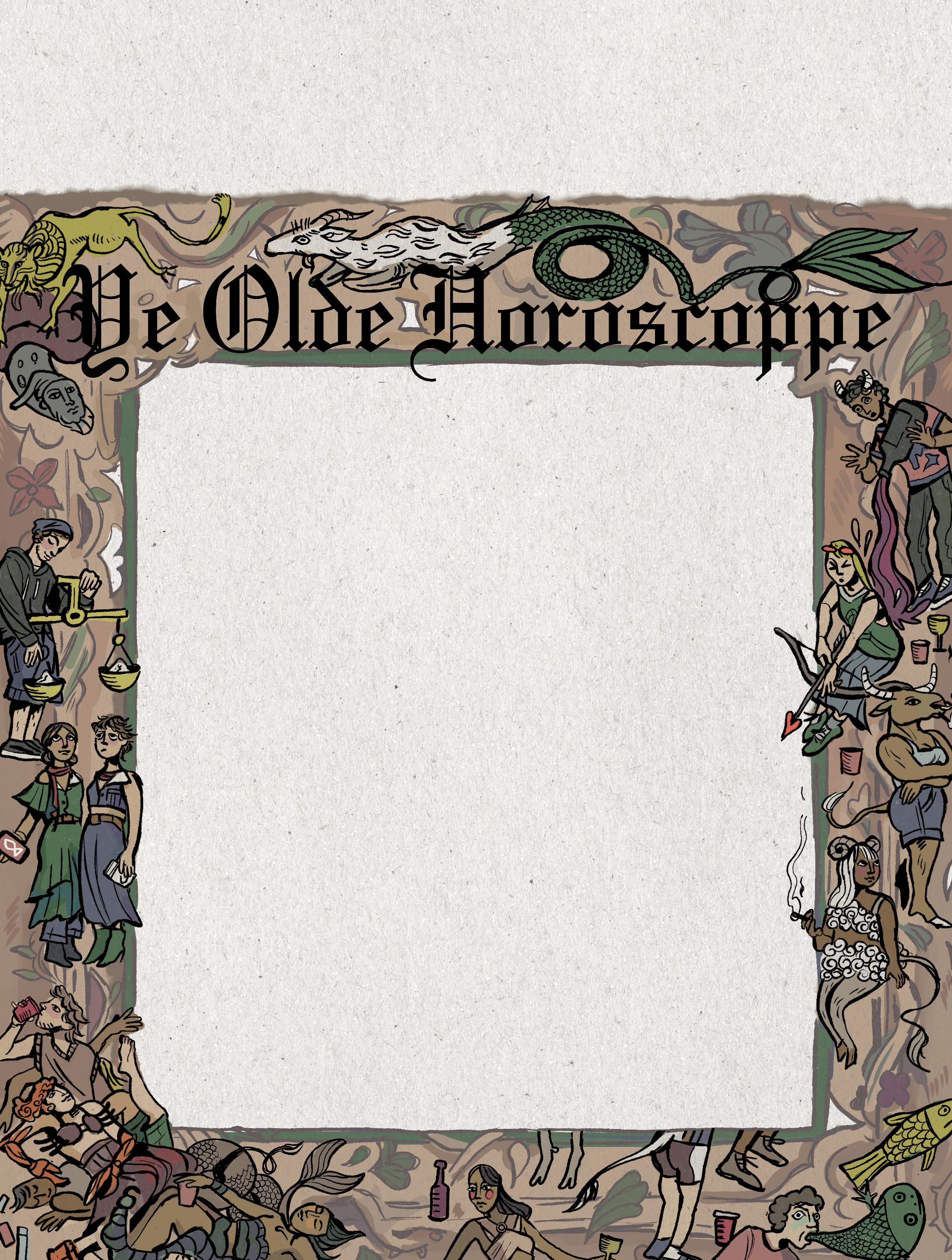
Aries
Manifest an A+ or at least a flatmate who does the dishes. The Kelburn campus trembles under your feet. Nothing else does, though.
Cancer
You cried on the 18 bus. Again. But this time, someone handed you a Whittaker’s square. There is still beauty. Even in Te Aro.
Libra
Your week begins mid-sprint. You do not know where you're going. You cannot stop. Someone asks if you're okay. You bite them. Keep moving. There's something chasing you. It might be your GPA.
Capricorn
You will try to explain your degree and spiral into a philosophical breakdown. Clarity arrives via a secondyear who thinks you’re their tutor. You now are. Sorry. Give them a reading packet.
I began experimenting with analogue photography as a medium for recording my gap years overseas but it quickly became my form of self expression. My photos largely consist of the natural world and my attempts at capturing dreamlike moments. This photo comes from my first experimentation in the dark room. Instagram: @sophiesdreamscape
Taurus
This week brings celebration. You will clap when your microwave finishes. You will cry at a pigeon wedding. Joy is in weird places. Attend.
Leo
Carrying the group project, emotional labour, and six overdue online library books. Put something down before you combust. Wednesday’s your best shot.
Scorpio
A mysterious opportunity calls. You ignore it. It calls again. This time it’s wearing jorts. Follow it. By Sunday you may be in Upper Hutt. Trust the journey.
Aquarius
You will try to change. You will fail. You will eat the same lunch three days in a row and call it "self-discovery." Embrace the rut.
Gemini
You will give someone a pen and they will give you a prophecy. Share your snacks. Beware of mysterious targeted posts on VUW Confessions.
Virgo
You will finish an assignment and ascend briefly. Enlightenment lasts 3.5 seconds. Then Google Docs crashes. Remember: you are the cosmos. But also, get some sleep.
Sagittarius
You enrol in a class that doesn’t exist. The door appears only at dusk. Attendance is mandatory. You learn nothing. Or everything. Your notes are just drawings of teeth.
Pisces
A nap turns into an unplanned deep dive into existential podcasts. You return wiser, or just more tired. Your brain has its own rhythm this week.
